
GREAT
SCOTT



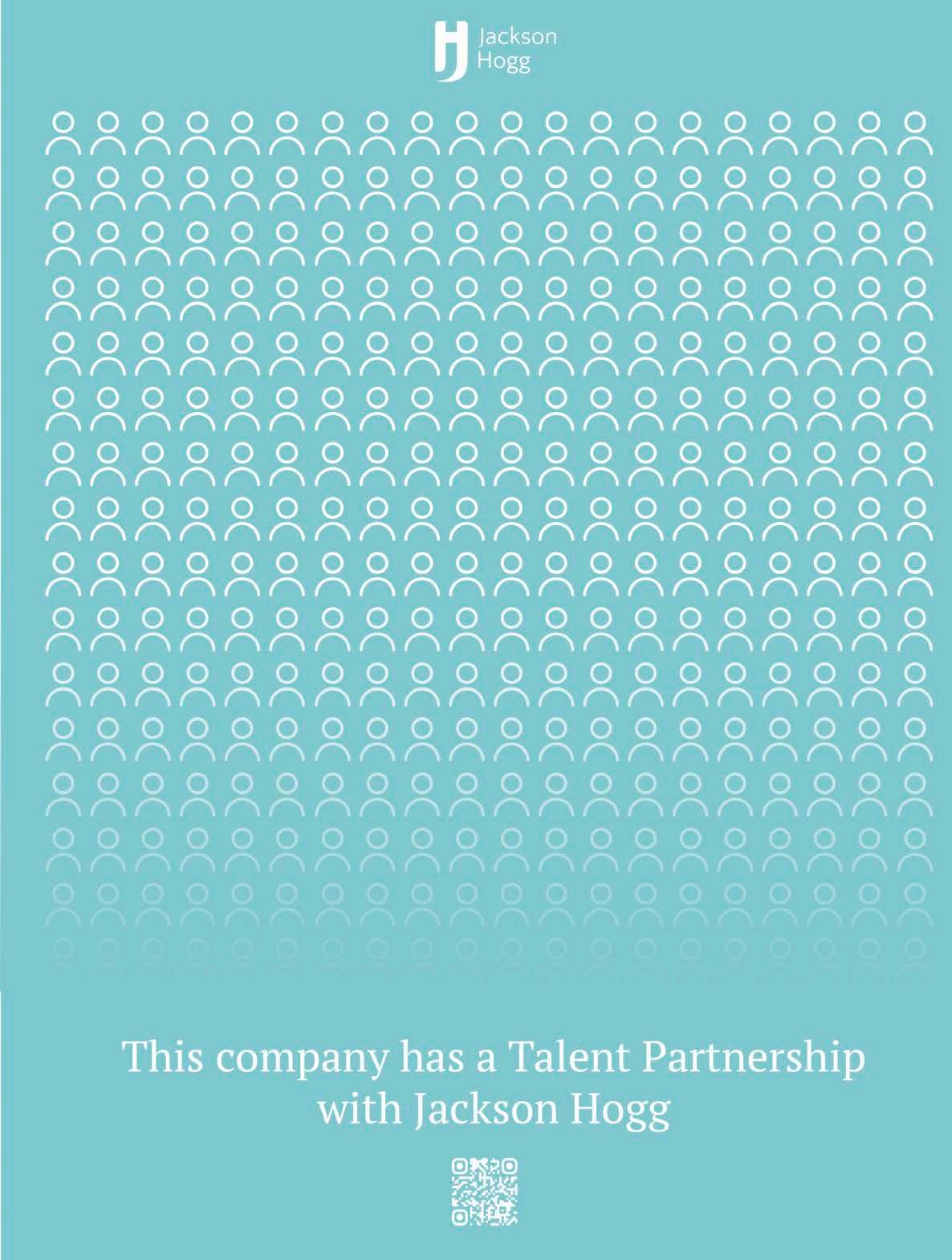
Editor
Steven Hugill steven@netimesmagazine.co.uk
Business journalist
Colin Young
T: 07808 974 533 colin@netimesmagazine.co.uk
Business development director


John Duns
T: 07920 152 523 john@netimesmagazine.co.uk
Creative and managing director
Peter Mallon
T: 07590 064 800 pete@netimesmagazine.co.uk
Partnership & marketing manager








Chloe Holmes
T: 07493 555 509 chloe@netimesmagazine.co.uk
Accounts
Jill Brown jill@netimesmagazine.co.uk
Filmography
Andrew Lowe andrew@netimesmagazine.co.uk
Contributors:
Dr Christian Marston
Gill Hunter
Charlie Nettle
Photography: Ben Benoliel www.benbenoliel.com
Mike Sreenan www.michaelsreenan.com
Christopher Owens www.christopherjamesowens.co.uk
Angela Carrington www.thisisthebiggerpicture.co.uk
Jamie Haslam www.roamwithus.co.uk
Head office 0.09 PROTO, Baltic Business Quarter, Abbot's Hill, Gateshead, Tyne and Wear, NE8 3DF
All rights reserved. Reproduction, in whole or in part without written permission, is strictly prohibited.
Circulation:
To confirm our circulation please contact Andrew Dunn, Stephens and George Print Group, email: andrew.dunn@stephensandgeorge.co.uk
To amend your mailing address or remove yourself from our mailing list contact chloe@netimesmagazine.co.uk
Contact: @NETimesmagazine enquiries@netimesmagazine.co.uk www.netimesmagazine.co.uk
Photography:
All photos taken by North East Times staff are copyright North East Times Magazine Ltd, and are taken solely for use in North East Times Magazine or products published by North East Times Magazine Ltd.
If you wish to use or publish a photograph taken for North East Times, please contact pete@netimesmagazine.co.uk

Advertising charges: There is a £25 charge for every set of amendments, following the first initial set of amendments, which is free of charge for adverts designed by North East Times Magazine Ltd.
Cancellations:
If an advert is cancelled by the booker within a seven day period prior to our print deadline, the advert will be charged in full, plus VAT.
Editorial:
Editorial must be received by the 9th of the month or no responsibility is accepted for errors. The opinions expressed in this issue are not necessarily the views held by North East Times Magazine Ltd.
Strategic partners Partners
Advertisements:
Although every care is taken to ensure accuracy, the publishers regret that they cannot accept responsibility for loss or damage caused by an error in the printing or damage to, loss of artwork, transparencies or photos.
Complaints:
Regarding advertisements will only be considered for up to a week after publication. Advertising must be received by the 12th of the month. No responsibility is accepted for errors.
Print:
North East Times is printed by Stephens & George Limited, a fourth-generation, award-winning printer based in Merthyr Tydfil, South Wales, which is a specialist in sheet-fed lithographic printing of magazines, brochures and programmes.
North East Times is produced using vegetablebased inks combined with innovative chemical-free plate and Heidelberg press technology.
All papers are sourced from well-managed, sustainable forests and Stephens & George’s vast supply chain holds many environmental accreditations.
In addition to this, they hold a Climate Change Agreement along with ISO14001, ISO9001, FSC, PEFC and offer Carbon Balancing via The World Land Trust.

They achieved an E2B Silver award for energy improvements along with an E2B Gold award for recycling; 98.5 per cent of all their waste is recycled. www.stephensandgeorge.co.uk


6
Published by North East Times Magazine Ltd. Credits
@2023

editor’s WORD
4 Hello and welcome to the latest edition of North East Times Magazine.
Now, before I begin, I’d like to point out I’m no meteorologist - I’d be as handy as Michael Fish in hurricane season.
Even I, however, can sense there is change in the air.
As this publication was being finalised, February was giving way to March, the slow shift towards lighter mornings and longer nights restirring the senses.
And the feeling of change and new beginnings carries through this edition, nowhere better highlighted than through our cover star Jill Scott.
As part of the triumphant England women’s Euro 2022 side, Jill provided welcome on-field relief to a country parched by a long major trophy drought.
But the change didn’t end on Wembley’s green expanse.
By lifting the cup alongside her teammates, the former Sunderland midfielder helped revolutionise focus on the women’s game, affording the sport much greater - and rightful - exposure, which continues to grow with every passing day.
Change is all Jill has known since that summer’s afternoon too.
From victory on ITV’s ‘I’m a Celebrity…Get Me Out of Here!’, to roller-skating with Olympic diving champion Tom Daley, paddle boarding with Robson Green and receiving the Sir Bobby Robson Foundation/North East Football Writers’ Association’s Personality of the Year Award, it has been quite the nine months.
She even managed to impress notoriously hard to
please ex-Sunderland AFC manager Roy Keane… Elsewhere, we speak to Councillor Graeme Miller, leader of Sunderland City Council, about the watershed political change promised by the north of the region’s £4.2 billion devolution deal.
With the mayoral-led power shift pledging to help create thousands of jobs and generate billions in private sector investment, Councillor Miller explains how it will unlock ‘big ticket’ projects and “limitless opportunities” across the North East’s seven northernmost local authorities.
Change is present too in the latest instalment of our high-level VISION 2031 campaign, wherein roundtable members analyse the region’s healthcare sector and the prospects upon which to fashion further positive moves.
We do the same in a special report on an event - held alongside law firm Womble Bond Dickinson, Invest Newcastle and UK Tech News (UKTN)which assessed the digital industry’s strengths and opportunities, and how and where its application can make a positive difference to organisations and people’s lives.
And we complement it all with an interview with TrendBible founder Jo Feeley.
Forced into a pandemic pivot, Jo’s Newcastlebased trend forecasting creation is material proof of change for the better, with the business now pressing ahead with global expansion plans.
8
I hope you enjoy this issue.
Steven
The world is a constantly evolving place, and, as Steven Hugill highlights, the North East is at the forefront of such change…
WELCOME TO ISSUE 457

p. 030-031
Contents
p. 036-045
As the clock ticks towards the next General Election, what are the key priorities you believe the principal parties must include in their manifestos to catalyse the economy and instil fresh market confidence?
 Words by Steven Hugill
Words by Steven Hugill
It's been an incredible year for Jill Scott. From winning the Euros with the Lionesses to being crowned Queen of the Jungle in ITV’s 'I’m A Celebrity… Get Me Out Of Here!', the last 12 months have been nothing if not eventful. That Wembley win was her 161st and final England appearance, and buried the pain of her own international near misses in a 17-year career that began at 18 for hometown club Sunderland in 2005.

 Words by Colin Young
Words by Colin Young
p. 053-060
Welcome to the latest instalment of VISION 2031, the campaign launched by North East Times Magazine that lays out a blueprint for how our region can stand at the vanguard of global industrial and economic progress across the next ten years.
Words by Steven Hugill
The Big Question
Great Scott
V31Breaking new ground: The North East’s key role in the healthcare revolution
10
p. 068-069
It may be known for its soft seating, but with a European expansion complementing high calibre boardroom additions and gold Investors in People accreditation, Cramlington-based Bazaar Group is very much a company on the move. Here, chief executive Mark Dolder tells Steven Hugill about the firm’s progress and why its growth trajectory is far from slowing down.

Five minutes with...
 Words by Steven Hugill
Words by Steven Hugill
p. 070-077
p. 094-101
With a £4.2 billion devolution deal agreed with Government, the north of the region stands on the brink of watershed change. Promising thousands of jobs and billions in potential private sector investment, the mayoralled power shift includes further significant funding for areas such as housing, skills and transport, and the creation of a louder voice to echo around Westminster’s corridors of power.
Limitless opportunity
by Steven Hugill
Words
When Jo Feeley picked up a creative industries honour at the Great British Entrepreneur Awards late last year, she could have been forgiven for pondering whether she'll collect the accolade in two years’ time. After all, it is her job.

Words by Colin Young
Booking the trend
11
Contents
Business spotlight
North East Times Magazine throws a spotlight on the latest news, views, trends and technologies shaping the region’s economic and business landscape
Sage arena gets £20 million boost as region receives £100 million ‘levelling up’ package Investment

Plans to create a sprawling riverside business and leisure campus have received a £20 million boost.
Gateshead Council’s blueprint for The Sage arena, conference and exhibition centre has been backed by Westminster’s ‘levelling up’ fund.
Set for land on Gateshead Quays, officials say the “visionary project” will welcome more than one million visitors a year and create thousands of jobs.
It was backed as part of a wider £100 million-plus Government package for the North East under its flagship regional equalising strategy, with schemes in Redcar and Cleveland, Hartlepool and Northumberland also receiving support.
Hailing the impact of Downing Street’s financial help to The Sage scheme [pictured], Councillor Martin Gannon, leader of Gateshead Council, said: “It’s great the Government has recognised
the benefits of development, especially during the current economic climate.
“As a council, we are dedicated to ensuring The Sage is delivered, so we can provide employment opportunities to residents of Gateshead and beyond.
“The economic benefits of The Sage will radiate out as local businesses and hospitality benefit from the increase of trade.”
Councillor Gannon also confirmed changes have been made to proposals around neighbouring hotels – planned for Gateshead’s Baltic Quarter – with the buildings now switched to another site as part of “cost efficiencies”.
He added land occupied by the hotels in original designs has been reclassified as an urban park.
Elsewhere, Redcar and Cleveland Borough Council has been awarded £19.9 million of ‘levelling up’ cash to make
significant improvements to market town Guisborough and highway changes at Coulby Newham, which bosses say will pave the way for 800 homes.
Staying in the south of the region, Tees Valley Combined Authority has received nearly £18 million to create new cycling and walking routes, with Hartlepool Borough Council receiving £16.5 million to create a so-called production village, which officials say will boost opportunities in the creative sector. Support also came for the North East Combined Authority’s work on decarbonisation, with the body awarded £19.5 million to fund a fleet of more than 50 electric buses and the installation of nearly 100 vehicle chargers.
And ministers have handed Northumberland County Council £14.7 million to build cycling and pedestrian lanes between Hexham and Bedlington.
12
Business Spotlight_
An artist’s impression of The Sage arena, conference and exhibition centre
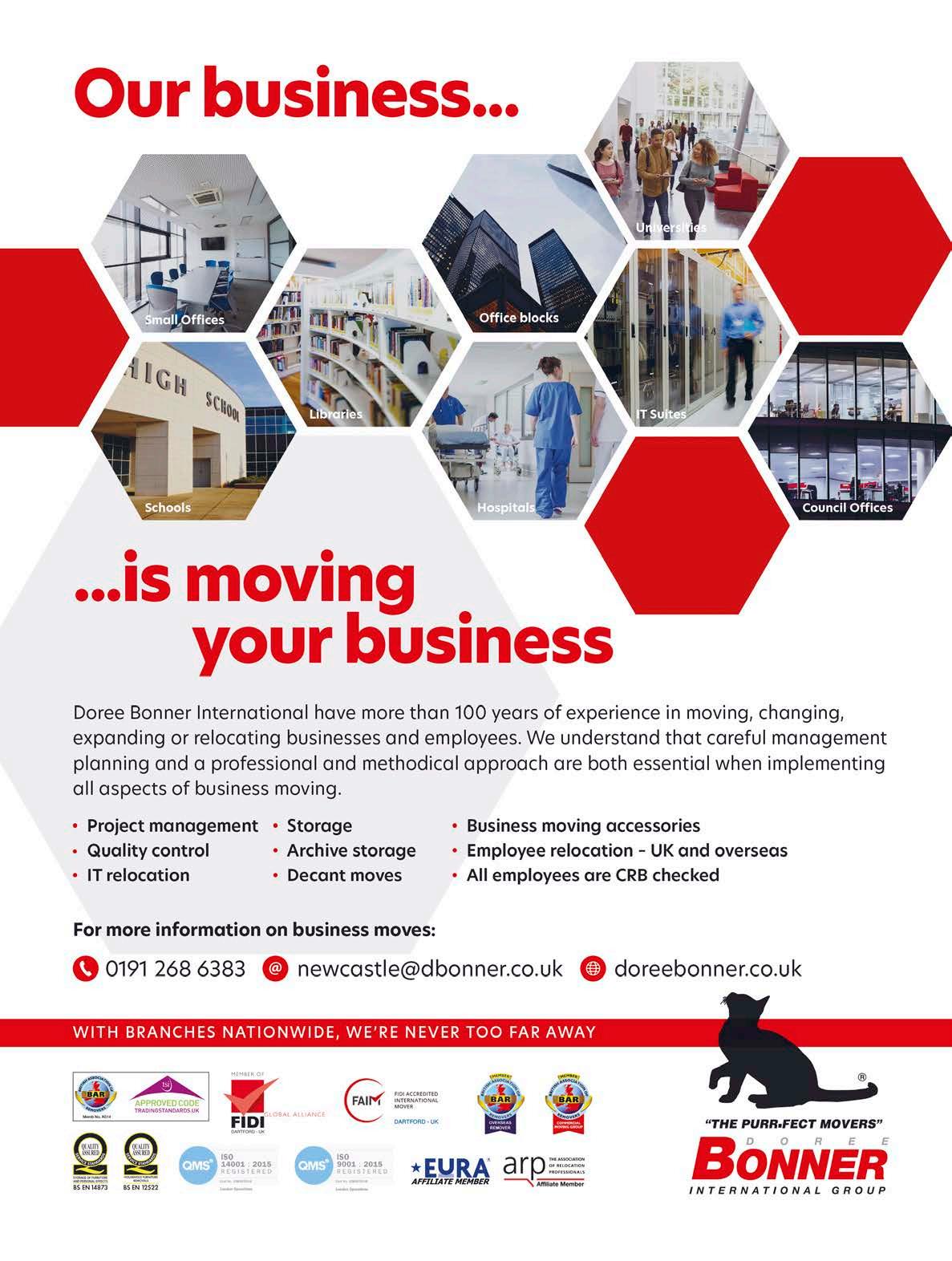
Defence firm Leonardo to create 200 jobs in city base Employment
A military helicopter maker has pledged to create 200 jobs after landing in the North East.
Leonardo is opening a research and development base on Newcastle’s Helix science park.

The company, which is also known for Royal Air Force electronics work, says the move will deliver more than £185 million to the region’s economy across the next decade.
Bosses say its Tyneside hub will focus on advancing new sensing, security and vertical lift products.
Clive Higgins, Leonardo UK chair and chief executive, said: “Our Newcastle site will allow us to expand even further.”

The business’ arrival was supported by Invest Newcastle.
Jennifer Hartley, director of the organisation, which is part of NewcastleGateshead Initiative, said: “This represents a major boost for the city’s burgeoning defence and aerospace sector.”
The North of Tyne Combined Authority also made more than £400,000 available from its Inward Investment Fund to aid the firm’s move to the region.
University of Sunderland plans £250 million campus transformation Education
A university has unveiled “game-changing” £250 million redevelopment plans.
The University of Sunderland is overhauling its Wearside base in a ten-year programme bosses say will bolster its “strong reputation for high-quality learning and teaching”.
According to the blueprint, its St Peter’s campus will undergo a near £100 million renovation to create a new international business school, library and student centre, with further work carried out to strengthen provision of computer science and engineering courses.
A second phase will include the Sunderland Health Innovation Zone and a sports ground.
A number of existing buildings and student accommodation will also be refurbished.
Tekmar Group continues investment talks Engineering
A marine engineer has extended talks with a prospective financier it says would fuel “ambitious” growth plans.
Darlington-based Tekmar Group is speaking to a global energy sector investor.
Bosses say an agreement would support organic and acquisitional expansion at the firm, which includes the Pipeshield International and Subsea Innovation operations.
Sir David Bell, vice-chancellor and chief executive, said: “This investment reflects the standing and confidence of the university as it seeks to fulfil its lifechanging purpose.
“It reflects too the transformational change that is taking place in the city of Sunderland, making it a great place to study, live and work.
“Students and staff will benefit from state-of-the-art facilities, enhancing our strong reputation for high-quality learning and teaching, and our society-shaping research and knowledge exchange activity.”
Sir David revealed the investment will also include work on the university’s London campus, to create a new Canary Wharf base and refresh student and staff facilities.
Farooq Hakim, chair of the university’s board of governors, added: “Such an investment will protect and enhance the long-term educational and financial sustainability of the university.”
It would also retain the business’ place on the London Stock Exchange’s AIM sub-market, and build on £10 million-plus contract successes.
Pipeshield International - known for subsea mattresses that defend lines and cables from damage - recently picked up “multiple contracts” worth more than £8 million to design and make protective equipment for Middle East projects.
And Subsea Innovation is working on a launch and recovery system – used to operate underwater robots – with the near £2 million deal including delivery of an A-frame, winch and hydraulic power unit.
14
Business Spotlight_
The University of Sunderland is overhauling its Wearside learning and student accommodation facilities
Leonardo is the latest name to join Newcastle's Helix science park

£35 million property fund provides jobs hope Property
Development bosses say the region is primed for thousands of jobs following the launch of a £35 million property purse.
FW Capital and the North East Local Enterprise Partnership have unveiled the North East Commercial Property Investment Fund.
Officials say it has potential to create 5600 posts and develop 140,000sq metres of business space.
Providing loans of up to £7 million, they add the fund will support speculative developments for new or refurbished projects across Northumberland, County Durham, Gateshead, Newcastle, North and South Tyneside and Sunderland.
They also say repayments will be pumped back into new schemes, creating investment of £119 million in commercial property over 15 years.
Helen Golightly, North East Local Enterprise Partnership chief executive, added: “Job creation and the growth of key sectors in the North East are being held back by the market not delivering sufficient high-quality business premises.
“There is a severe undersupply of Grade A commercial space, which is limiting some types of inward investment or current regional businesses to scale to the next level.”
Armstrong Watson grows with Joseph Miller deal Finance
An accountancy, business and financial advisory firm says it is primed for further market success after completing a merger.
Newcastle-based Armstrong Watson has bought accountancy practice Joseph Miller.
Bosses say the deal provides “an incredibly strong foundation to grow further in the North East.”
All 22 Joseph Miller staff have joined Armstrong Watson, including partners David Gold, Chris Reah and Edith Chapman.
Growth plans will help bowling firm ‘remain market kingpin’ Hospitality

A hospitality boss behind bowling and e-sports ventures says “the shackles are off” to achieve “endless possibilities” after confirming London and Irish expansion plans.
Tim Wilks has unveiled major growth blueprints for Lane7 and Level X, which he says will build on “electrifying” progress.
According to the proposals, two London sites will open before the end of the year, with further Lane7 bases set for Dublin, Bath and a second hub in Birmingham, which will operate as the group’s largest venue.
Elsewhere, the business plans to roll out “several” Level X launches, which will include a unit in Middlesbrough featuring electronically-synced karting in a so-called Drift Hall.
Tim said: “When we launched Lane7 ten years ago in Newcastle, the response immediately told us we had a pioneering concept.
“And we’ve now reached a stage where there is not only continued huge demand for our product, but also an expectation that we keep pushing the boundaries of late-night socialising.
“Making plans for an aggressive European offensive and to land hard in
London is an enormous statement of intent.”
He added: “We’re so excited to unleash Drift Hall, in Middlesbrough.
“It is an indoor karting track, but racers will be able to drop virtual banana skins and leave virtual oil patches to slow or stop rival racers.
“We broke the mould and disrupted a social scene crying out for evolution, and our expansion plans keep us firmly at the forefront of UK hospitality.”
Expansion in pipeline at tube maker Engineering
A tubing maker has eyes on new jobs and US expansion following financial backing. Advanced Composites Engineering aims to grow after £150,000 North East Growth Capital Fund support helped it secure a manufacturing and supply deal with a global industrial cleaning kit firm.
Don Robinson, director at the Cramlington-based company, said: “2022 was a challenging but successful year, and we’re now well set to build on what we’ve achieved.”
The North East Growth Capital Fund is supported by the European Regional Development Fund, and managed by Team Valley’s NEL Fund Managers.
Jane Siddle, NEL Fund Managers’ senior investment executive, added: “The business is in a strong position to take big strides forward.”
16
Business Spotlight_
Tim Wilks, Lane7 and Level X owner and founder
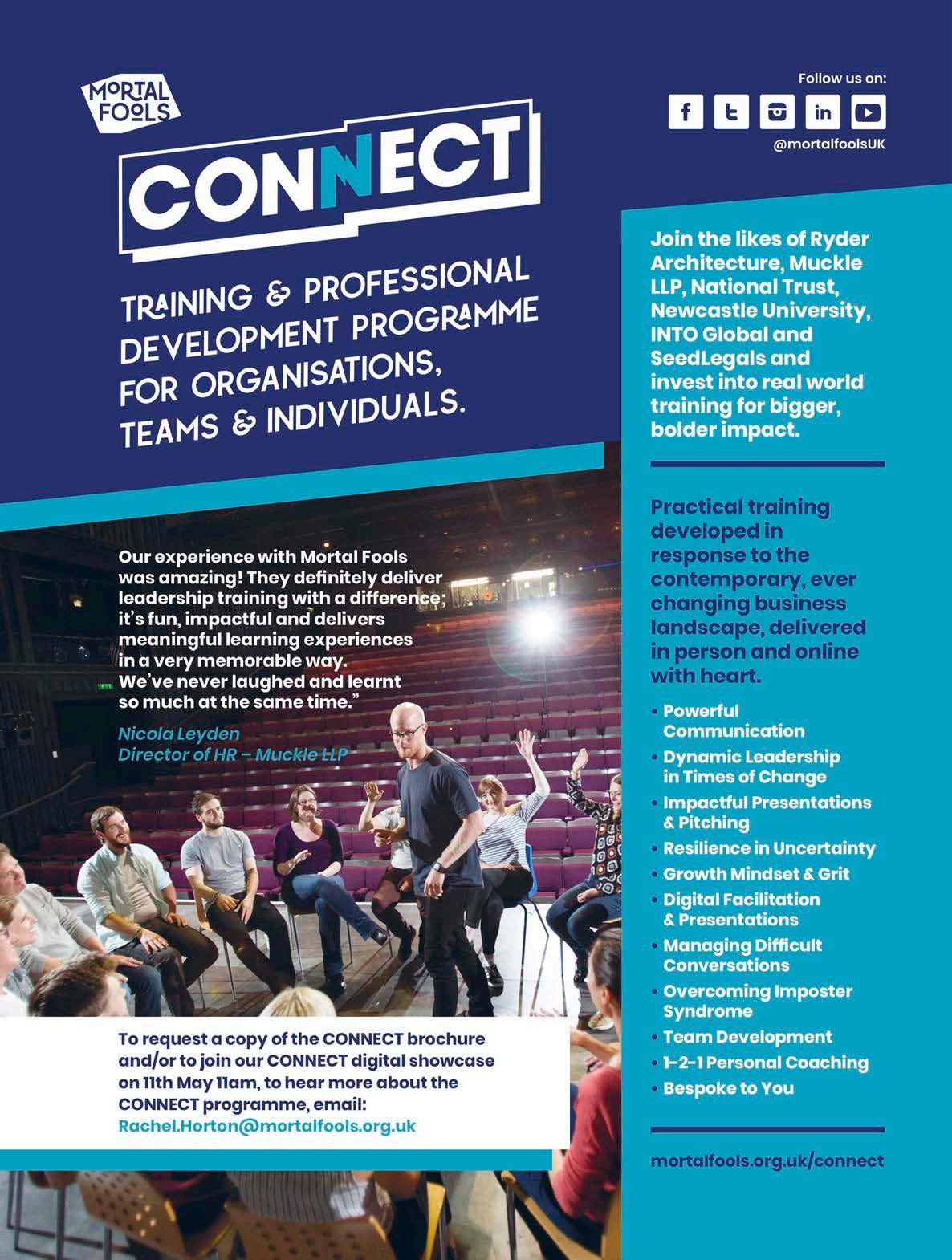
In Brief
A selected round-up of stories from across the region
Quantafuel gains backing for Wearside plastics plant Investment
A recycling company has received approval for a 100-jobs-plus factory.
Quantafuel Sunderland is building a Wearside plant.
Bosses say the base, set to open in 2025 at Port of Sunderland, will annually transform around 100,000 tonnes of plastic, such as soft food packaging, into raw materials for the petrochemical sector.

Winifred Patricia Johansen, Quantafuel Sunderland director, said: “We chose Sunderland as our first development as the port provides an ideal location, and the city has a good, skilled workforce to draw on.”
For more news and views across the North East, visit our website @ www.netimesmagazine.co.uk/news
Fabrication firm adds steel to rail station work Construction
A Middlesbrough fabricator is supporting a £34 million overhaul of the town’s rail station.

CB Construction (Cleveland) has secured a deal to fashion upgrades including a new ticket hall and staircase at the travel hub.
The firm is using materials bought from British Steel, which runs the Beam Mill, at Lackenby, near Redcar, and a special profiles plant in Skinningrove, east Cleveland.
Gary Sivills, CB Construction (Cleveland) managing director, said: “It’s great to play an important role in a scheme that will
make a big difference to our hometown.”
The station project is being delivered by Network Rail, and a 75-metre platform extension has already been built to accommodate new LNER London services.
Tees Valley Mayor Ben Houchen, alongside the Tees Valley Combined Authority, has pumped more than £20 million in the scheme.
He added: “It’s fantastic to see CB Construction taking such a central role.”
Meanwhile, Mayor Houchen recently helped professional services firm Aon officially open a base in Thornaby, near Stockton, which it says will support future expansion plans.
Christine Wood, head of office for Aon Stockton and Newcastle, said: “The investment is a step forward for the business and the team.”
18
Business Spotlight_
Gary Sivills, CB Construction (Cleveland) managing director, left, with Tees Valley Mayor Ben Houchen and the steel set for use on Middlesbrough rail station
4Accountancy firm Azets has revealed plans to create 150 North East jobs as part of a wider blueprint to increase revenue by 50 per cent over the next five years.
4Stockton energy data and information services firm EnAppSys is now part of The Riverside Company. It will operate as an add-on to Riverside’s Montel AS platform, a Norwegian energy and electricity market information provider.
4Newcastle-headquartered wealth management firm Fairstone has bought Surrey-based Mantle Financial Planning. Officials say the move has added more than £450 million of funds under management to the group.
4Roger Kilburn has been appointed North East of England Process Industry Cluster (NEPIC) chair. He has replaced PX Group’s Mark Kenrick.
4Sir Nigel Wilson, the North Eastborn chief executive of Legal & General, who has overseen huge investments in Newcastle’s Helix science park and Sunderland’s Riverside scheme, is to retire. Roger said: "I'm very much looking forward to setting the direction for the future.” Limitless opportunities - see pages 70 to 77
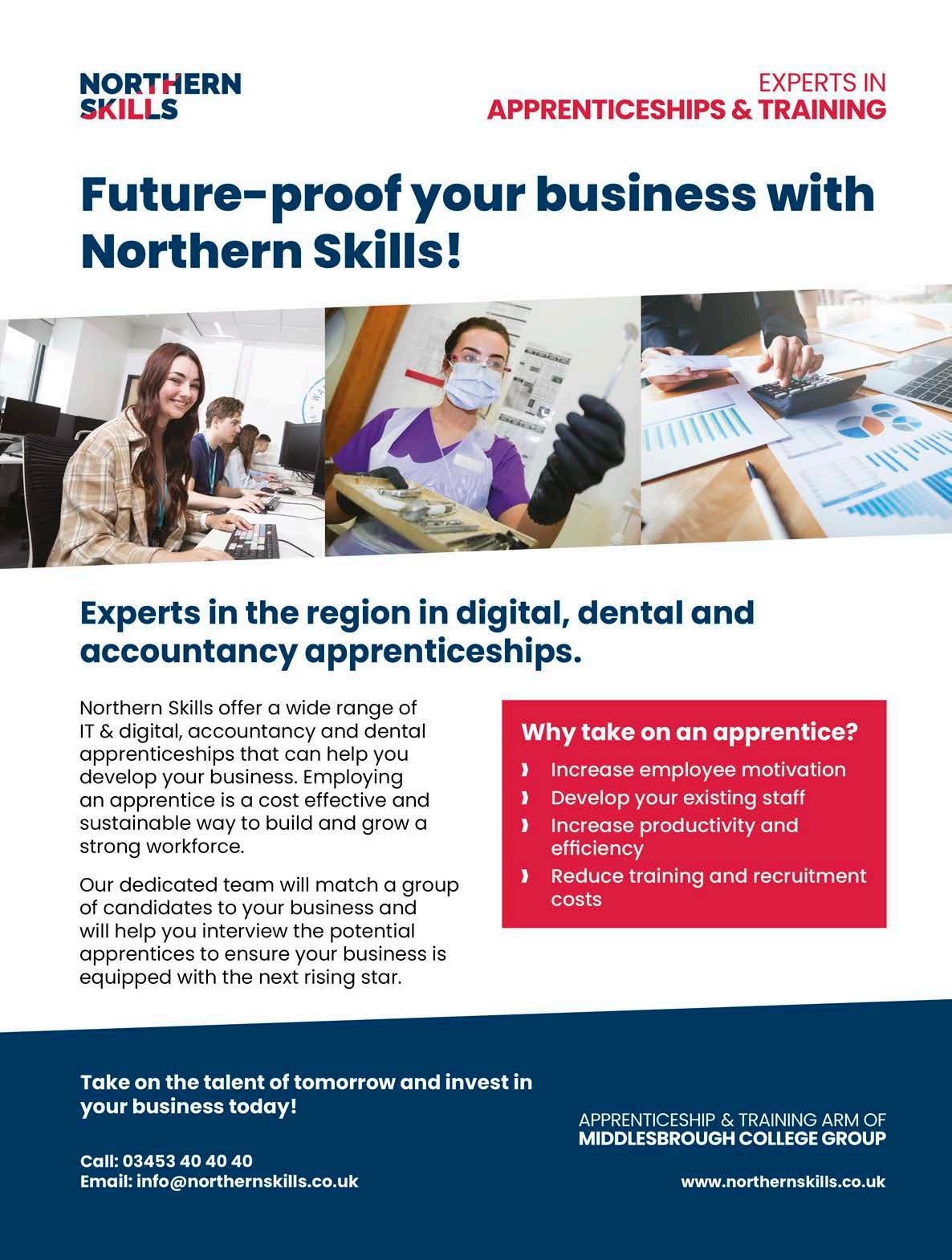
A fresh injection of power
With Recharge Industries primed to seal a takeover deal for stricken Britishvolt, a fresh chapter stands ready to be written in the region’s sustainable transport sector. Here, Steven Hugill assesses the fall-out from Britishvolt’s collapse, and how Recharge Industries’ imminent arrival provides great potential to accelerate the North East’s contribution to the green motoring revolution.
4The green motoring revolution and Phil Oakey don’t necessarily strike as instant bedfellows.
But when you’ve written enough stories about the great transport transition, and seen enough sub-editors affix an ‘electric dreams’ style headline to your copy, the connection becomes less contrair.
Indeed, even now to put together an article on sustainable travel sets my mind away to the twinkling opening bars and video lip-syncing of Oakey on ‘Together in Electric Dreams’, the Human League frontman’s mid-1980s collaboration with Giorgio Moroder.
And I found myself in familiar territory again a few weeks ago, when Britishvolt, once tipped to dramatically accelerate UK vehicle battery production, ran out of power and spluttered into administration.
This time, though, it was another of the unlikely musical duo’s creations which came to mind - ‘Good-Bye Bad Times’.
The up-tempo, synth-pop number talks of a fresh start and a change of luck.
And it couldn’t be a more apt soundtrack for the decline of Britishvolt or, more specifically, the emergence of Australia’s Recharge Industries, with the latter aiming to reimagine the region’s - and UK’s - electric motoring dreams.
The takeover deal - which was being finalised with administrators as North East Times Magazine went to print - renews hopes of a jobs bonanza, of resurrecting the anticipation spurred by Britishvolt’s plans to create a £3.8 billion, 3000-job battery plant in Cambois, near Blyth, Northumberland.
So too does it revive optimism around creating fresh meaning for a former pit village, which, since the end of its coal heyday, has been locked in a semi-permanent search for identity.
Cambois, by virtue of its perch where land meets water, is well used to the unforgiving swipes and strikes of North Sea weather.
But Britishvolt’s failure provided an altogether stronger slap across its cheeks.
Its vision had provided an escape, a chance to imagine life on an avenue of prosperity, where a new industrial legacy - beyond cradle-to-grave colliers - would be carved out across future generations.
And the story began brightly enough; the poeticism of transforming an ex-power station coal store into a sprawling renewable battery plant bestowed instant page-turner status.
Furthermore, with a site envied by many for its size, as well as its port links and national grid connections, it had more than sufficient chapters to build a wider narrative.
20
Transport Opinion
Words by Steven Hugill
Crucially, however, Britishvolt didn’t have customers (there were memorandum of understandings with Lotus and Aston Martin). And it didn’t have the cash.
And without those, its arc took a decisive nosedive, taking with it the emotions of Cambois residents, as well as those across the wider region and the majority of the 300 staff on Britishvolt’s payroll.
The episode was a bruising period for the Government too.
Having lauded Britishvolt as a pioneer, in the process committing to a £100 million Automotive Transformation Fund deal, the firm’s demise leaves a number of questions to be answered, not least why Downing Street threw so many eggs into the basket of a company founded in just 2019?
To an extent, its support was obvious.
With the UK woefully short of factories to make the electric batteries needed to offset the end of petrol and diesel vehicle sales across the next decade, and therefore facing increasing market challenges from overseas suppliers, Britishvolt told a story the Government
needed to hear.
The fact bosses had chosen the North East for its factory, an area inherent to Boris Johnson’s ‘levelling-up’ agenda, only added to the lure.
But despite the many positive updates and photo calls, including one with former Chancellor Kwasi Kwarteng suitably togged in high-visibility jacket and hard hat, the threads of the relationship frayed.
Wrangling over Automotive Transformation Fund cash, with the Government wanting milestones to be met before monies were released, achievements Britishvolt was apparently unable to secure without the finance, created a tailspin-like effect.
Staff took pay cuts, and an 11th-hour investor deal provided backing to take Britishvolt into 2023 on a footing, so said officials, which would provide “a bridge to a more secure funding position for the future”.
Within days of the new year, however, the metaphorical crossing had disintegrated, a sad and abrupt ending for a company whose prologue had promised so much.
And one too that provides a reminder
of the importance of strong Government and private sector collaboration.
But the story of the North East’s green transport revolution doesn’t end with Britishvolt.
In truth, it was one of many in a much wider narrative.
One that includes Envision AESC and Nissan, which are partnering on a 1000job Wearside battery plant.
One that includes Washington-based power train maker Advanced Electric Machines.
One that includes battery system manufacturer Turntide Technologies.
One that includes recent Teesside recruit Altilium Metals, which promises a 250-job plant that will reprocess elements from spent batteries into key components for new power packs.
And one that should soon include Recharge Industries.
And it all means that while Britishvolt’s existence ended in a nightmare, the North East’s electric dreams are very much still alive.
There's that song again...
Driving ahead with transport changesee page 22
21
Opinion
Leading the way again
Transport
Like its famous iron and steel, Teesside’s global manufacturing reputation is one forged from decades of toil and no little skill and pride.
And in a world of seismic industrial change, the area’s standing is poised to rise again.
With the transport sector going through the gears on a journey towards greater sustainability, Teesside is ready as a key navigator, having beaten off competition to welcome Altilium Metals to its commercial fold.
The firm plans to build a 250-job recycling factory, at a yet-to-beconfirmed location, which will recover minerals from old vehicle batteries for use in new power packs.
A copybook example of cleaning up a polluted motoring sector, it’s also a fine example of Teesside’s wider reinvention as a green hub, and a region once again helping to lead the way through meaningful change.
Words by Dr Christian Marston Co-founder at Altilium Metals

Driving ahead with transport change
With the transport sector accelerating towards a greener future, the need for sustainable power has never been more important. And one company helping the transition is Altilium Metals. The firm is bringing a 250-job plant to the Tees Valley, which will recycle elements from spent battery waste into key components for new power packs. Here, Dr Christian Marston, the business’ co-founder, reveals more about its ambitions, and why the Tees Valley was an obvious choice for its factory.
4 200 years after the region’s coal and iron helped to build the industrial world, the North East is once again at the forefront of an industrial revolution.
From Nissan’s flagship electric vehicle plant and Envision AESC’s new gigafactory in Sunderland, to the UK’s first lithium refinery in Teesside, the region is leading the charge to position the UK as a global player in the new green energy economy.
This spirit of innovation, coupled with the rich industrial history of the Tees Valley, is a big part of the reason why Altilium Metals chose Teesside as the location for an ambitious new project that will also play a big part in achieving the UK’s net-zero ambitions, as well as attracting jobs and investment to the region.
With more than a million electric vehicles on our roads, the UK is at the forefront of the transition to greener transport, and the shift from an energy sector based on fossil fuels to one based on minerals.
However, nearly 100 per cent of the components required for electric vehicle batteries are manufactured overseas, with China dominating the supply chain for critical metals such as lithium, cobalt and nickel.
With soaring demand for these elements, the UK finds itself increasingly reliant on global supply chains that are vulnerable to disruption.
While domestic mining projects might help to meet some of that demand, a more sustainable solution lies in recovering these
metals from the tsunami wave of used batteries that is heading our way.
Today, Altilium Metals is the only company in the UK capable of recovering these critical metals from spent electric vehicle battery waste.
Our proprietary technology works to recover more than 95 per cent of the critical minerals and rare earth elements from end-of-life batteries, which can then be reintroduced into the supply chain to build new battery cells here in the UK.
Choosing Teesside as the location for our first UK recycling plant, capable of processing battery waste from 150,000 electric vehicles per year, was a no-brainer. With its world-class workforce, fast and efficient logistics, zero-carbon electricity and a freeport, the region has everything our business needs to succeed.
With this investment of more than £500 million, Teesside will become the centre of a new sustainable supply chain for battery chemicals, helping to drive down costs and carbon emissions, while also providing the energy security needed to attract investment in new automotive gigafactories. In March, we will complete our feasibility study on the plant, and more details of the chosen site will be announced soon.
We expect to create 250 highly-skilled jobs at the plant, with thousands more created in build phase, and we look forward to supporting economic growth in the region and building on its proud tradition of innovation and invention.
22
Guest contributor Dr Christian Marston_


Journeying into the new world of work Employment
Where once salary, holidays and associated terms and conditions were the default setting for many a candidate, today’s prospective employees have markedly different priorities.
From environmental, social and governance responsibilities to hybrid working and the creation of a diverse and inclusive culture, workers’ expectations of companies have
significantly changed.
And it is crucial businesses take heed.
Those that do, the ones that redefine frameworks and embrace a more democratic environment, will make themselves magnets for top talent, in the process accelerating growth and furthering expansion ambitions.
Those that don’t, however, will find themselves shunted into the slow lane.
they were told, out of fear of losing their job.
The workforce of today, young and old, however, has had enough.
They don’t want a cumbersome hierarchy, an all-sticks and no-carrots approach to performance, inflexibility and no work/life balance.
They want a kinder and fairer way of working - and rightly so.
And it’s up to business leaders to set the standard.
People want to be able to come to work as themselves, have some autonomy and choice over day-to-day activities, and be empowered to act and make decisions.
They want to be fairly rewarded and recognised for their contribution, feel valued and have a clear sense of direction and purpose – for them and the business.
Gone are the days of micromanagement, autocracy and ‘everything needs to go past x’ - working collaboratively and considering the interests of all stakeholders is key.
Words by Gill Hunter Managing partner at Square One Law

There is a tendency when leading a business to focus on the external. But the world of work is evolving, and now, more than ever, leaders must ensure they are engaged with their people and ready to embrace change like never before. Here, Gill Hunter, managing partner at Square One Law, explains more.
4We have a national skills shortage across most sectors and business types, so retaining, training and motivating your existing team is crucial.
And this doesn’t mean pandering to a so-called ‘snowflake’ generation - it means understanding what makes your team tick and valuing them as individuals, rather than ‘human resources’.
Most law firms have been well behind the curve when it comes to wellbeing, team development and progressive leadership.
The innately competitive nature of the chargeable hours culture and the lack of tolerance for any perceived weakness have led to a fairly toxic and unhealthy environment in a lot of places.
A lawyer, who joined us from a large London firm, told me how, after zero sleep following three nights of work on a major deal, they were sent home in a taxi, told to go into their house, touch the wall and return to work to fool their body and mind into thinking they’d had a rest.
A ridiculous proposition, but they did as
Leaders must be inclusive, not to tick ED&I boxes but to create stronger decision-making processes that replace echo chambers of like-minded folk.
Diversity is important, not just because its right (opportunity should be equal for all), but because business is better.
And at Square One Law, we are determined to break the mould.
We are creating frameworks to accommodate difference and create a more equitable workplace.
We are exploring different ways of running the business, shaking up meetings and using different approaches to encourage challenge and overcome the perpetual problem of ‘owner’s truth’.
We have created a number of forums to listen to, and learn from, our people.
We are redefining what it means to be professional, which isn’t about the suit you wear, the colour of your hair or the long hours you work.
True professionalism means delivering the best service you can, all while taking great interest in yours and your team’s personal development.
25
contributor Gill Hunter_
Guest
Progressive leadership: why inclusivity, authenticity and clarity of purpose are key
Port of TyneTo find out more about the Port of Tyne, its Tyne 2050 strategy, Tyne Clean Energy Park and the 2050 Maritime Innovation Hub, visit www.portoftyne.co.uk
Creating a platform for significant change
With work to transform its sprawling estate matched by wider environmental endeavours and a desire to support economic and social prosperity in the North East’s shifting political landscape, the Port of Tyne is at the axis of great change. Here, Steven Hugill chats to Matt Beeton, the trade hub’s chief executive, to find out more.
www.portoftyne.co.uk
@Port_of_Tyne
Matt Beeton tugs at the thick collar of his high-visibility jacket, adjusting his stance to face the length of a mottled grey-white concrete expanse.
Over his shoulder, a heavy roller emerges from behind a bank of bright yellow cabins as excavator buckets gouge new courses in the land.
Great change, as well as an unforgiving wind, is in the air at the Port of Tyne.
It began in late 2019, when Matt, nearly a year into his role as the trade hub’s chief executive, unfurled its Tyne 2050 blueprint.
Planting seeds for the base’s long-term future, the venture sets nearly 30 headline targets - from carbon neutrality and eventual all-electric operations, to doubling diversity and catalysing cross-industry collaboration - which aim to place the port as a pivot point in environmental, digital, social and maritime transformation.
And the first shoots are more than coming through.
From the concrete square upon which Matt stands today, soon will rise a home for the energy of tomorrow, an offshore wind contractor lying in wait for a new factory where coal was once processed.
The scene is replicated around a bend in the Tyne, where Dogger Bank wind farm joint operator Equinor runs a scarlet-cladded, 200-job operations and maintenance headquarters.
Both firms were attracted by the port’s 200-acre Tyne Clean Energy Park.
Straddling the river across four sites, the development is a flagship scheme within Tyne 2050, its
creation providing both the space and transport links for renewable firms, marine engineers and their supply chains to flourish.
Matt says: “When I arrived at the port, it was still reliant on coal, and we needed to think of a new business model and what we stood for.
“One of our key targets was to align ourselves with generational jobs, and be part of areas such as the green energy market.
“Tyne 2050 was founded to help us do that, and we’ve made fantastic progress.
“Attracting Equinor was a massive plus.
“The jobs and value for the port and the region from Equinor’s arrival have been phenomenal - if all options are taken, that company alone could represent nearly 100 years’ worth of operation.
“Equinor came here because it could access skills, but it did so too because our visions aligned.”
And Matt reveals the momentum behind Tyne 2050 - which aligns with the Government’s own Maritime 2050 policy and the North East Strategic Economic Plan - is being maintained by the development of further redundant port areas for prospective operators, with the ambition having recently helped two long-term renewable and recycling partners extend tenancies.
He says: “We spent more than £10 million on the port last year, which was more than had been invested in a decade, and we want to double that figure this year.”
However, the blueprint extends far beyond earthmovers and land remediation.
In a world of evolving energy and efficiency drives,
26
Logistics_ Advertising feature_Port of Tyne
the port - which helps power one in every eight lightbulbs and processes 40 per cent of the UK’s tea stocks - is matching physical revision with digital and psychological change.
Key to its efforts is the Maritime 2050 Innovation Hub, which stands close to the port’s Jarrow Road entrance.
With partners including Teesport operator PD Ports, Nissan and Blyth’s Offshore Renewable Energy Catapult, the endeavour works with the Department for Transport and industry body MarRI-UK to develop solutions capable of making environmental, economic and social advances, across areas such as artificial intelligence, the circular economy and the future of mobility.
Matt says: “We use the phrase ‘intentionally ambitious’ here, and the Maritime 2050 Innovation Hub is a great example of that in action.
“We launched it to corral ports, organisations and people into thinking about - and tackling - the challenges we’re facing.
“I’m a firm believer in collaborating with other players, and it has worked really well.
“We’ve got a great foundation to make significant progress.”
Those advances, says Matt, will be supported by other partnerships to further influence positive change across global shipping.
He says: “We’re sharing non-sensitive data with other ports around the world, to see how we can better do things across areas such as cost, speed to market and decarbonisation.
“For example, we might think we’re doing something right here, but it might be forcing more carbon down the supply chain elsewhere, and we really want to understand our place as a link in that longer chain.”
And such commitment to collaboration extends to the North East’s governmental landscape.
With agreement in place for a £4.2 billion, mayoralled devolution deal for the north of the region, Matt wants the area’s maritime cluster - which includes the Port of Tyne alongside the region’s other sea-based hubs and airports - to unite and maximise the power shift’s potential.
He says: “The opportunity is there to make a massive difference.
“If you look at what is happening in the North Sea, around areas such as offshore wind and hydrogen, we could be the epicentre of clean energy for the UK and beyond.

“If we are smarter about coordinating ourselves and about emphasising each of our unique points, in conjunction with what is happening on Teesside and Scotland’s planned east coast freeport, we could do so much more.
“Pulling the region and its assets together would provide scale, from which we could generate and attract investment to plan a new hinterland.”
Matt adds: “We have a platform to do something special, to increase prosperity and create more jobs.
“It’s all to play for, and I can’t help smiling about the proposition before us.
“The opportunities are endless.”
27
Logistics_ Advertising feature_Port of Tyne
Matt Beeton, chief executive, Port of Tyne
Supporting a new industrial dawn
From the creation of a green energy hub to major aviation investment and rising river-borne trade, the Tees Valley’s commercial sector has newfound momentum. And at the heart of the progress is The Endeavour Partnership. Here, Steven Hugill speaks to managing partner Lee Bramley, to learn more about the Stockton-based law firm’s support for the region’s renaissance, and why seeing the area thrive means as much personally as it does professionally.
https://endeavour.law
@Endeavour_law
The sun rises over Lee Bramley’s shoulder, spreading speckles of yellows and gold across the undulating waters of the River Tees.
In the foreground, the early Edwardian splendour of Middlesbrough’s Transporter Bridge stands silhouetted. A poster project for the sweat and toil of the area’s industrial heyday, it’s a scene enough to make any proud Teessider’s heart swell.

Middlesbrough’s famous crossing, a new commercial dawn is rising.
Art has met real-life, and Lee, as managing partner at The Endeavour Partnership, is fully immersed in the glow.
He and the Stockton-based firm’s expert teamswhich provide advice across areas such as commercial property, employment law and HR, and corporate and commercial matters, the latter including banking and finance support - are playing a fundamental role in the area’s reawakening, replacing the painter’s palette with brushstrokes of their own.
Operating as Tees Valley’s largest commercial law firm, the business is a crucial cog in the regeneration wheel.
Helping organisations right across the TS postcode, from family-founded transport firm AV Dawson to Wynyard Park franchise operator Racz Group, it is also supporting Tees Valley Combined Authority with economic growth and job creation as part of its elite legal panel.
“We are a Teesside business - there are eight equity partners who own The Endeavour Partnership, and six of us are from Teesside,” says Lee, who grew up on a Middlesbrough terraced street.
He adds: “We understand the landscape, and we’re committed to making it a better place to live and do business.
Far from being a lament to the generations of yesteryear, however, the tableau - hung on a wall in Lee’s home office - is in fact a window into a new world.
With Redcar’s sprawling old steel site being transformed into the Teesworks green energy hub and trade burgeoning on the waterway straddled by
“It is really important to us as individuals, and The Endeavour Partnership, to make that happen.
“Growing organisations lead to more jobs and regeneration, and more money being retained in, or moving back into, the community - and we are proud to be supporting such expansion.
“Over the last ten years, for example, AV Dawson has
28
Law_ Advertising feature_The Endeavour Partnership
Pictures: Jamie Haslam/ROAM
evolved into a much larger organisation, doing exactly that - and we’ve been with them all that time.”
The nurturing extends further, however, with Lee - in his role as chair of trustees at The Teesside Charity - and The Endeavour Partnership both cultivating a hothouse environment wherein the next generation of seedlings begin growing into fully-rooted success stories.
Formerly known as the Middlesbrough and Teesside Philanthropic Foundation, the charity has created a bursary scheme that funds a student’s journey across a three-year Teesside University course.
Elsewhere, The Endeavour Partnership, which employs 44 staff in offices watching out over Stockton’s rapidly-changing waterfront, offers annual training contracts and provides work experience and ‘day in the life’ insights for scores of students every year.
“Helping the area and the people where you’re from has, over time, become more important to me,” says Lee, who was previously part of the team that ran the Finlay Cooper Fund, the charity established by exMiddlesbrough FC defender Colin Cooper and wife Julie following the death of their two-year-old son.
Lee says: “It comes back to being involved in the growth and success of Teesside.
“As a younger person, there are three things you need to help establish your career – a work ethic, a talent or ability and then an opportunity.
“And that last point really resonates with us at The Endeavour Partnership; it’s why we work so closely with Teesside University,” says Lee, who studied at the Middlesbrough-based institution with grant support.

He adds: “We have no glass ceiling; of our eight owners, two began as trainee solicitors here.
“We’ve always grown organically, and our success has, in no small part, been down to the loyalty of our people.
“We have very low staff turnover because there is a pathway to the top, and we are committed to helping more get onboard and have successful careers.”
Such action to augment the region’s talent stream will, of course, help deepen The Endeavour Partnership’s own skills pool, which will in turn provide fresh momentum to a firm primed for another record financial year.
Fuelled by recent tier one Legal 500 rankings - which include a citation praising The Endeavour Partnership for its ‘national firm level service’ - and rising local demand, as well as international work, means it is set to exceed the £508 million deals total it achieved in the year to July 2022.
The Endeavour Partnership
As the largest commercial law firm in the Tees Valley, The Endeavour Partnership is experienced in all aspects of business law. Recognised for its specialist departments and multiple layers of expertise, the firm offers commercial legal solutions that go beyond static advice, and is committed to producing innovative options for clients while still demonstrating business-focused thinking.
For more information on how its expert services could help your business, visit http://endeavour. law or contact 01642 610300.
Key to such financial success, which places The Endeavour Partnership within the higher echelons of the wider North East legal sector, are its service levels and the tremendous client longevity they foster.
Lee says: “We often get enquiries about a potential deal involving a company we’ve never worked with before, but which has come to us on recommendation.
“A German company looking at a deal on Teesside called us recently - we were endorsed by someone we’d worked with 12 years ago.
“We also have a very good track record of working for organisations being acquired by a national or international company, and then retaining that successor business into a new long-term relationship.”
And Lee says such reputation will remain a key factor as The Endeavour Partnership looks to grow through 2023 in a market affected by ongoing turbulence from the legacy of COVID-19, rising inflation and Russia’s Ukrainian invasion.
He adds: “We are cautiously optimistic; we’ve seen no reduction in work - in fact, we’ve seen quite the opposite.
“We’ve made great progress and, as we go through this year and further onwards, will continue delivering our expert services to support clients across Teesside’s changing landscape and beyond.”
29
Law_ Advertising feature_The Endeavour Partnership
The Big Question
investment but will see the UK plummet from having the fifth most competitive tax system in the OECD to the 30th.
The UK must prioritise green growth, as it is already falling far behind international competitors in Europe, Asia and the US.
Current energy costs, among the highest in the EU, are already placing great strain on our homes and businesses, so rapidly expanding the UK’s commitment to energy reduction is essential.
The CBI estimates that failing to invest will result in the UK losing out on £4.3 billion of green growth by 2030 alone, underlining the necessity to incentivise investment.
Germany is streets ahead in the development of heat pumps and insulation; France leads the way in electric vehicle charging infrastructure, and the US is focusing on operational carbon capture.
The UK lags behind in all these areas, despite the fact the drive to net-zero can create farreaching growth opportunities.
I’d also like the next Government to incentivise businesses to create more jobs, in particular apprenticeships, to help overcome the massive skills shortages in a range of industries, including construction.
There should also be a rethink on abolishing the corporation tax super-deduction, which will not only remove the stimulus for business
Investment in the education and training landscape should be at the forefront of parties’ policies.
It’s absolutely crucial education and skills training are accessible to the people who need it, in order to fill gaps in the national skillset. Being in the education and training industry, we have frontline exposure to how skill shortages can directly impact organisations’ capacity to recruit competent and productive staff.


Targeting this area will create pipelines of talented individuals with expert industry knowledge, and will serve to ease the impacts of the cost of living crisis that businesses are currently navigating, by improving productivity.
Investing in this field will also catalyse social mobility.
We will see the stimulation of job opportunities, industry flexibility and innovation, plus billions of pounds in additional revenue.
It will see direct and positive impacts on business investment, salary promotions and increases, and an improvement in social
30
AMAN CHAHAL Co-founder and chief executive TaperedPlus
BRENDA MCLEISH Chief executive Learning Curve Group
As the clock ticks towards the next General Election, what are the key priorities you believe the principal parties must include in their manifestos to catalyse the economy and instil fresh market confidence?
The Big Question
wellbeing, public health and civic engagement.

It is imperative funding is increased to enhance the accessibility of education and skills training, as is advocating its benefits and increasing the exposure of these opportunities to the general population.
MICHAEL HOGGART UK plant manager TMD Friction

From a business leadership perspective, my key priorities would be energy efficiency, the cost of living crisis and cutting NHS waiting times.
With regard to energy efficiency improvements and net-zero, I would urge the Government to look at reducing VAT, which would likely help create an ‘able to pay’ market in energy efficiency.
Being more energy efficient as a country, with key changes and improvements implemented at the highest level, would reduce our carbon emissions, which can also be linked to keeping people warmer in the home, reducing illness and keeping customer bills down.
In my eyes, this would be a win-win. Elsewhere, we have to continue to reduce inflation and the country’s national debt.
This would help with the cost of living crisis, which is impacting so many people up and down the country.
Finally, I’d like to see NHS waiting times cut, so more people get the treatment they need.
of practice Newcastle University
Co-chair
While it may not be the immediate vote winner this Government will be seeking, I believe that making it easier and more attractive for firms to engage with the apprenticeship agenda would help boost business confidence while addressing potential future skills shortages.
At the moment, some of the region’s largest businesses have a substantial amount of unspent levy. This is investment that had been destined for apprenticeships, but is now being handed back to the Treasury, where it potentially will be spent on anything but the skills agenda.
Complexities remain around the apprenticeship levy transfer, and while the process has been simplified somewhat, many businesses still do not know this and are not prepared to consider it as a source of funding, even though it has the potential to be of enormous benefit to them.
I believe regional businesses would much rather see - and get behind - a policy that delivers the unspent levy back into the region, to promote, enhance and encourage firms to engage more with skills development.
31
PROFESSOR IAN GREEN Professor
North East Apprenticeship Ambassador Network
The Big Question
Putting plans in place for the future
With the ever-changing commercial landscape placing increased demands on owner managers, many are rewriting blueprints to secure fresh futures. For a good number, those drafts pivot on fundraising and succession planning. Here, Steven Hugill speaks to Chris Hird, corporate finance partner at accountancy and business advisory firm Haines Watts, to learn how its expert support is helping bosses take their next steps.
www.haineswatts.co.uk
@haineswatts
Business is emotional.
Whether hothousing a back bedroom venture into a multi-million-pound enterprise, writing the next chapter in a family firm’s legend or ceding control to a new owner, the journey is laden with feeling.
It isn’t without complications, either.
With political and economic shocks exacerbating a world altered irrevocably by COVID-19, the commercial landscape is nothing if not turbulent.
And caught in the middle are owner managers, the changeful environment stirring their every sense.
Relief then, for accountancy and business advisory firm Haines Watts, which melds passion with proactivity and sentiment with skilled support to deliver calm among the commotion.

Particularly intrinsic is its guidance around fundraising and succession planning, the significance of which, says Chris Hird, corporate finance partner, continues to escalate in the post-pandemic panorama.
He says: “There has been a real change of dynamic, with lots of owner managers, across all sectors, making decisions on their futures.
“For example, there are some, who are now in their mid-50s and who rebuilt their businesses after the 2008 credit crunch, who don’t have the same energy to do so again after COVID-19 and are looking to sell.
“And it is making for a buoyant market; there is a lot of activity, particularly around transactions worth between £2 million and £15 million.
“At the other end of the spectrum, there are businesses that weathered the storm and are wanting to grow again, and owner managers in their 20s and 30s, who see a world of opportunity they want to fund.”
Facilitating the evolution is Haines Watts’ trusted team of experts, which combines financial knowledge with an empathetic approach that speaks to every owner manager.
Chris says: “Finding the right support is a little like a jigsaw puzzle - you need to have all the pieces and put them in the correct places.
“But it’s a very bespoke process too, and the advice we provide ensures clients receive comprehensive guidance distinct to their circumstances.
“For example, if a client wants to expand an operation while retaining 100 per cent of the business, one of the areas we would discuss would be debt funding.
32 Finance_ Advertising feature_Haines Watts
Chris Hird, corporate finance partner
“Conversely, if a client wanted to sell shares to aid growth plans, we would talk about equity funding.
“The latter typically allows faster growth, but means a client is handing over part of an organisation.
“It’s ultimately about matching funding with aspiration, laying out the options and how they complement owner managers’ respective positions.”
Such discussions have taken on greater importance in recent months, with subdued post-pandemic economic sentiment - impacted in no small part by Liz Truss’ mini-budget - compounded by rising energy and supply chain costs.
The volatility means owner managers need more support than ever, particularly when trying to understand the mounting stringency surrounding capital release.
Chris says: “The world is a very unpredictable place, and attitude to risk has risen massively, certainly among the high street banks.
“Lenders are looking for that bit more visibility and information than they perhaps were in the past.
“And we’re attuned to that; we’re increasingly helping owner managers with business plans, forecasts and further information to ensure they more than meet criteria.”
The support to which Chris alludes effectively stitches Haines Watts into a firm’s fabric, allowing it to provide various strands of support that make a material difference to an organisation’s market standing.

He says: “We become an extension of their operations, an impartial sounding board for an owner manager to express their thoughts.
“A lot of business owners are very good at what they do, but they sometimes can’t see the wood for the trees.
“The advice we provide, however, allows them to step away and gain some clarity.
“We discuss their ideas and plans, assessing all options, and those conversations can, at times, be frank.
“But if it is the right advice, it is the right answer, and being involved in this way can really change a business’ trajectory for the better.
Haines WattsFor more information on how Haines Watts’ expert support could help you with fundraising or succession planning, contact Chris on 0191 269 9960 or email chird@hwca.com
“Discussions might focus on a client’s incumbent bank, for example, and how another lender could provide a quantum of money to expedite growth plans.
“On other occasions, they might be about acquisitions.
“It’s a cliché, but for the perfect acquisition, two-plustwo should, ideally, equal five or six, and through our talks we’re able to identify which potential target would marry best with a business’ existing operations.”
And, says Chris, the guidance is always delivered sympathetically against each owner managers’ backstory.
He adds: “We know the sentiments attached to a family firm, and the sacrifices people have made - and continue to make - to grow their organisations.
“And we respect and harness that raw emotion into advice and support that enables them to confidently move forward.”
33
Finance_ Advertising feature_Haines Watts
Corstorphine & Wright leading the way in sustainable design for healthcare

Corstorphine & Wright is one of the top 25 architecture practices in the UK, with more than 270 employees across 11 nationwide studios.
www.corstorphine-wright.com
@CWrightarch
Celebrated for its design expertise across a diverse range of sectors, Corstorphine & Wright is one of the leading architecture practices in the UK, particularly applauded for its innovation and ingenuity in design and delivery of its healthcare projects.
Corstorphine & Wright believes architecture is an opportunity, where every building offers possibility to improve the quality of life, and where architecture elicits empathetic connections, thereby not only instilling a sense of place but manifesting a reflection of ourselves.
It is this philosophy to which the practice applies to its work across all healthcare projects.
With two North East studios, in Darlington and Newcastle, the team at Corstorphine & Wright is at
the forefront of sustainable design.
Julie Smyth, Newcastle studio associate director, says: “Each healthcare project is unique and architecturally distinct.
“However, they derive from the same fundamental design principles - light, openness, connectivity and intimacy through space.
“Through meaningful considerations of the human need and our vast experience within the design space, this allows us to create spaces that are functional yet beautiful, a place people want to be (as well as need to be).
“People are at the centre of everything we design for our health and care environments.
“Staff and patients and their relatives - those who
34
Architecture_ Advertising feature_Corstorphine & Wright
need help and those who are there to help.
“We believe in the importance of architecture that promotes both good health, in tandem with user functionality, thereby improving user flow while ensuring the positive wellbeing of all future building occupiers. in tandem with user functionality, thereby improving user flow while ensuring the positive wellbeing of all future building occupiers.
“Consequently, we foster close personal cooperation with our clients, in order to find new ways to connect people and their environments.”
Karen Crowe, Corstorphine & Wright’s ESG director, adds: “It is also more important now than ever before to ensure healthcare facilities are healthy by design in the context of both occupant wellbeing and the environmental impact.
“As such, we incorporate future-thinking and environmental impact into our designs in the form of smart use of materials and working to zero-carbon emission targets.
“But this is only the start. “Cleaner, greener and healthier buildings are our focus, and this informs the buildings and spaces we create.”
Corstorphine & Wright’s healthcare experience is wide ranging and includes acute, primary, secondary and tertiary care, and mental health care architecture in both public and private healthcare settings.
“We also specialise in healthcare planning and strategic masterplanning.
“We have extensive experience in creating comforting and supportive environments for those living with dementia, autism and other complex needs in all settings including community and social care, and care homes, etc. A recent project is Grove House Care Village, for Springfield Healthcare, a Grade II listed manor house set in almost two hectares of protected landscaped gardens. The existing manor will be converted into 24 assisted living apartments for 65 years-plus, while east of the manor, a new 63bed residential/care home will be constructed for 75 years-plus.

Julie adds: “Grove House Care Village has been designed in such a way that enables pioneering integrated intergenerational care on site.
“There will be a woodland classroom and nature trail with associated app and local schools will also use the village’s internal and external facilities.”
Sustainability is also at the heart of this design, through the materials chosen and the planned reduction in carbon footprint of the over build by sourcing local materials and supplies.
Innovate design and construction processes on projects such as Grove House are transforming the architecture of our healthcare.
Corstorphine &
WrightCorstorphine & Wright is an award-winning architectural practice with 11 UK studios, employing more than 270 people. Ranked at number 22 in the AJ100, Corstorphine & Wright designs spaces with that elusive musthave quality, translating requirements, constraints and opportunities into places that are more than the sum of their parts; places that invigorate communities and maximise long-term civic and commercial value.
35
Architecture_ Advertising feature_Corstorphine & Wright
GREAT S C O T T
36

37

38
It's been an incredible year for Jill Scott. From winning the Euros with the Lionesses to being crowned Queen of the Jungle in ITV’s 'I’m A Celebrity… Get Me Out Of Here!', the last 12 months have been nothing if not eventful. That Wembley win was her 161st and final England appearance, and buried the pain of her own international near misses in a 17-year career that began at 18 for hometown club Sunderland in 2005. Off the field, Jill has been just as busy, with her ‘retirement’ opening up a new world of opportunities. Here, speaking to North East Times Magazine’s Colin Young during a return to Sunderland and her old school Monkwearmouth Academy, she looks back on an extraordinary time while looking forward to picking up the Sir Bobby Robson Foundation/North East Football Writers’ Association’s Personality of the Year Award at Ramside Hall Hotel in early March.
4Forget winning the Euros, the 161 England caps, the league titles and FA Cup medals, the MBE for services to football, the BBC team of the year award, the Jungle crown, the Sir Bobby Robson Foundation Personality of the Year Award.
Jill Scott knew she’d made it when she invited Roy Keane to the coffee shop she runs in Wythenshawe, Manchester - and he turned up.
Her diary may be full, but she still puts in the occasional shift at Boxx2Boxx, the venture she co-owns with partner Shelley Unitt.
And she was there when Roy joined its rapidly-increasing throng of customers earlier this year.
Jill says: “I met him when we were in Qatar; he doesn’t live far away, so I said, ‘if you ever want to pop in for a coffee…’ and he came in.
“I thought the shop would be too busy, but he just sat in the corner with his family.
“We’ve had Roy, Kevin de Bruyne, Phil Foden, Jamie Redknapp, Micah Richards and a lot of Corrie stars come in too.
“I’ve worked the last two Sundays, and it’s the hardest work I’ve done since retirement!
“The queues never stop out the door, it’s ten til four, just constant drink after drink after drink.
“I make the coffees - I’m not trusted to make the food.”
It’s not just drinkers’ tastes for lattes and cappuccinos that have kept Jill busy, though.
She says: “It’s been mad.
“I should write down what I’ve done because there has been some incredible stuff; a talk with Sir Geoff Hurst, a talk with Harry Redknapp, TV punditry with Jamie Redknapp, in Qatar with Roy Keane, Ian Wright and Gary Neville, roller-skating with Tom Daley, paddle boarding with Robson Green.
“It’s been manic.”
Keane was one of her footballing heroes growing up and trying to play football in Sunderland - a city which hindered, rather than helped, her early passion - which she adores and eventually
played a major role in her journey to becoming England’s secondhighest capped player.
She loved Keane, David Beckham and Steven Gerrard. All hard, but brilliant, midfielders.
And all men.
Thanks to the Lionesses’ Euros triumph last summer, where Jill played a role in securing England’s first major trophy since 1966, however, today’s young players now have poster girls too.
“They were my role models, male footballers, because that's what I could see on the TV,” she says.
“It's great now that the women's game is more visible and accessible.
“We're in a really good moment on the back of the Euros.
“It's important to reflect and look how far we've come, but there's a whole other level that we can unlock.”
Jill was the winner of 'I’m a Celebrity… Get Me Out Of Here!' from the moment she came on screen displaying the team ethics she’d driven into herself from a young age, helping fellow contestant Charlene White walk along a plank 10,000ft in the air.
And her success has propelled Jill into a world she didn’t know existed.
Yet a year ago, she was fighting for the right to be in Sarina Wiegman’s Euros squad. And struggling.
As her great friend, team-mate, fellow Mackem and former England captain Steph Houghton was to discover, the England boss is a ruthless, winning coach.
Not featuring at her club Manchester City, Jill joined Aston Villa on loan, but suffered a knee injury, putting her inclusion in doubt.
She spent a month in rehab with Houghton, at the FA’s St George’s Park base, in a desperate bid to be fit.
“In all honesty, at that time last year, I was struggling with football a little bit,” she says.
“I had my eyes on going to the Euros, but I was not playing at Manchester City; I knew I had to get a move.
39
Words by Colin Young Photography by Ben Benoliel

40

41

42
“It’s such a massive privilege to receive this award, and I’m delighted my family can share the special occasion with me”
“I was so fortunate with my career, I didn’t have any injuries, I only missed ten days on a couple of occasions with my ankle and then, leading up to the Euros, right at the end of my Aston Villa stint, my knee just started blowing up.
“I got myself ready, but I knew I wouldn’t be able to do another season.
“Steph and I went through that period together, and it was really difficult to see her not get selected.
“Although people are happy you’re going, when your friend doesn’t make it, it’s very difficult and sport can be ruthless like that.
“It was a difficult time for her.
“We had a meeting, where we were told if we were going or not.
“I was so nervous. I felt I had a 50-50 chance because of the way my knee had been.
“I knew I’d got myself back to full fitness, but Sarina’s very much all about winning, and she wouldn’t have taken me if I hadn’t been 100 per cent.
“It was like going on trial again, like all those years ago, and fortunately I got through.”
Those trials take Jill back to her battles to play the game at all.
From the age of nine, her group of friends were forbidden from playing in boys’ games in the Russell Foster League.
They found sanctuary and sanity at Boldon Community Association Football Club, where Paul Smith had a girls team.
She won the Junior Great North Run and North of England Under-13 crosscountry title, and had to decide between football or running.
She says: “Some of the boys’ parents hadn’t seen girls play football, and if you have a son and he is precious and a girl is beating them, it is a kind of kick in the balls, so to speak.
“I probably got bullied a bit because people just didn’t understand why a girl wanted to play football.
“But those things make you tougher, make you more robust and as my career went on, I knew how to better deal with difficulties.”
Displaying a determination to succeed
and make the most of her natural talents and athleticism, Jill travelled from the grassroots of Sunderland to the dizzy heights of title-winning teams and international honours.

She won the WSL player of the month shortly after her 2005 Sunderland debut, but as the women’s team disintegrated, she joined Everton a year later and quickly won her first England cap followed by a WSL title and Women’s Cup.
Seven years later, she joined Manchester City, where she won a second WSL title, three WSL Cups and scored in one of three Women’s Cup final victories.
In 2009, she was among the first 17 players to be offered a central contract by the FA, and only Fara Williams has played more games for the women’s team.
In her 15-year international career, which included two Olympics with Team
GB, she suffered a Euros final defeat in 2009 and World Cup semi-final loss six years later, before the life-changing Wembley win last June.
Jill says: “I don't actually think I'd have gone on to play for England without Paul Smith and Boldon CA.
“He picked us up, took us to training and ran the whole team.
“They’re my happiest memories; getting up dead early on a Saturday, playing football, travelling around with the girls and having such a laugh.
“I always doubted myself a little bit deep down.
“I always believed I was going to work hard, I was going to run the most, fight the most - those were my things.
“But as I got older, and I was playing with these incredible players, I always questioned whether I was good enough to play with them.
43
“That's why, when I look at that gold medal, I know how much hard work went into it.”
Her return to Monkwearmouth Academy is to unveil a plaque in her honour outside the sports centre where she spent most of her school and student life; she went on to study at Gateshead College and Sunderland and Loughborough universities.
Jill made her connections to sport in these halls and walls, and one thing hasn’t changed.
Her former PE teacher Judith O’Leary is still rushing around, although she stops briefly for a hug beside the plaque.
It’s one of four, the others dedicated to Coronation Street actor Melanie Hill, former Sunderland city councillor Bob Francis and BBC Look North presenter Jeff Brown, who is on hand to interview his fellow alumni for that evening’s programme.
She is respectfully mobbed as she prowls round the sports hall before taking in a dodgeball game and the opportunity for some impromptu keepy-ups when a ball falls at her feet.
The smile never leaves her face for the entire visit, but she looks happiest controlling that ball to a smattering of applause.
After a Q&A with the football academy lead Jamie Chandler and a roomful of pupils, Jill displays her new-found skill in the endless selfie world, holding court in reception, taking phones and using her extendable arms to get the highest and best shots.
It is a skill she has perfected.
She says: “It’s 20 years since I left school, and the change is massive.
“When I first walked into reception, I was like, ‘wow’.

“It just brought back so many memories, but the fact they now have a football academy is brilliant.
“The head teacher Mike Grummett was lovely; you can see he has a real genuine passion for the area, the school and the kids.
“It’s great to see it doing so well, and the students were so polite.
44
“This is where I was shaped as a character and a person first and foremost, and I think that’s the most important thing for life.
“It’s great to go on and have sporting or academic success, but becoming a good person is most important.
“People can always want their kids to be academic and succeed in that way, but if children are polite and will have conversations with you, that is even more important.
“It doesn’t take much to be nice sometimes.”
Because she took a packed lunch most days, burning those calories immediately in the aforementioned sports hall, Jill was rarely a partaker of the Queens Cafe 50p special - chips, gravy and bread - and the current generation are forbidden from the abundance of seafront cafes.
Now, though, she tucks into the chips for the purposes of a photo shoot, and when word spreads of her presence, a couple of family friends appear, or a friend of a friend of her mam…
It’s the same when we head to Roker beach.

Hardly anyone doesn’t recognise her; every request is greeted with a smile and some Jill time. She likes it best when football gets a mention first.
Jill says: “I think knowing you have the ability to make someone happy, even if it’s just taking a picture or signing something, is lovely.
“I do enjoy it. I like people and I like chatting to people, and I’ve always been like that.
“Before this year, people would sometimes recognise me, but be a bit tentative when it came to saying hello.
“But with the jungle, they get to know your personality a bit, so it’s quite nice, and I hope people think I’m a warm personality to talk to.”
So what's next?
There are so many doors open to Jill that, when she eventually gets the chance to pause for breath, she will be spoilt for choice.
It will involve football; she’s determined that will be her legacy.
Coaching clearly appeals, and she’s proving a natural at motivational speaking.
She says: “I’m getting back on the grass doing some coaching and keynote talks, speaking to business - I've spoken to Google and Meta.
“It’s good because there are so many crossovers with business and sport, and journeys and reaching for targets. I’m enjoying that.
"Long-term, it’s difficult to say.
I’d like to be back in football eventually, but I was so busy playing, and being a coach or manager is doubly as busy.
“I’m not ready for that right now.
"There are three female coaches in boys academies in the country, and I’d like to do a bit with boys teams.
“To have a female manager in the men’s game is the top of the pyramid, but we need to get more women coaching the boys' academies so that becomes the norm.
“I’ve just stopped after 30 years.
“Football was my life for 20 years, and I’m still watching games and getting that injection of adrenaline - I’m just not ready for that every single day yet.

"I could see myself coaching, I don’t know about managing.
“I think I’d like to be on the grass doing the sessions and having camaraderie with players and a bit of a laugh.
“You can get away with that as an assistant; as a manager you have to try and be more sensible.
“I see myself as the Good Cop.
“If I was manager, I’d be wanting to play everyone, and saying, ‘we’ll go with 22 players today…’”
45
Perspective Financial Group
Operating from more than 20 bases across the UK, including Newcastle and Darlington, Perspective’s local offices provide financial planning advice on matters including retirement, laterlife and long-term care planning, inheritance tax, investments and protection and corporate planning.
If you would like to speak to a member of the Perspective team about your pension plan, or discuss another aspect of your financial portfolio, call 0191 217 3340 or 01325 289400.
Photos: Michelle Mercer Photography
Burns Night festivities raise vital charity funds
Financial planning and wealth management firm Perspective (North East) Ltd supported NE Youth’s Annual Burns Night Ball, which provided a huge boost to the charity’s work.



www.pfgl.co.uk
@perspectivefgl
A night of dancing and donations drummed up nearly £30,000 for charity.

NE Youth’s Annual Burns Night Ball summoned the spirit of Scotland’s favourite son to help the organisation continue its work with the next generation.
The evening was supported by financial planning and wealth management firm Perspective (North East) Ltd, with reeling and Highland dancing complementing the traditional piping and address of the haggis.
Guests were also able to bid on more than a dozen auction prizes - including use of Newcastle Racecourse boxes and British Open golf tickets - with £27,000 raised for Blaydon-based NE Youth, which provides a safe place for people between 11 and 25 to learn new life skills, meet friends and try different activities.
Ian Wilkinson, Perspective (North East) Ltd’s managing director, says: “It was a great pleasure to be lead sponsor of this fine evening, and we hope to be able to make an ongoing contribution to this fabulous charity, which faces a continual battle for funding.
“Having seen a reduction in Government funding of 96 per cent over the past ten years, it is testament to the team’s drive and ambition to succeed that the charity remains in existence and continues to deliver extremely valuable work for young people.”
46 Finance_ Advertising feature_Perspective Financial Group

Building for the future
Amid the ever-changing employment landscape, worker empowerment and cultural inclusivity have never been more paramount. For firms, it means a rewriting of operational blueprints, not least a bolstering of HR frameworks. And helping organisations do such is specialist recruitment and outsourced talent services partner Jackson Hogg, with its flagship HR Partnership service supporting businesses to invest in their staff for the long-term. Here, Steven Hugill speaks to Lauren Bathan, Jackson Hogg’s head of HR Partnership, to find out more.
www.jacksonhogg.com
@JacksonHoggRec
A
market-leading product. Tick.
A skilled employee base. Tick. A robust balance sheet. Tick.
In the manual of building a successful business, each and all are crucial foundation stones.
Equally significant, though, is a strong HR function, which provides not just a fourth stabilising base but a platform that catalyses technological development and nurtures the business leaders of tomorrow.
And ensuring organisations have such is specialist recruitment and outsourced talent services partner Jackson Hogg, which works with myriad organisations, such as Newcastle clean energy business GeoPura, to provide expert HR support that evolves as it continues to grow.
Through its flagship HR Partnership service, the firm provides companies – many of which span the science, technology, engineering and manufacturing (STEM) sectors - with bespoke support that catalyses sustainability and scalability, cultivates talent pipelines and inspires cultural advances.
Providing a portfolio of flexible options, Jackson Hogg accelerates the roll out of numerous HR-based initiatives, from transactional and administrative to transformational and strategic.
“By cultivating and investing in HR strategy, a company is developing its staff to progress the business over the long-term,” says Lauren Bathan, Jackson Hogg’s head of HR Partnership.

“And engaging our services is a very powerful symbol of where people feature and their importance in an organisation’s mind.
“There is a compound effect of Jackson Hogg’s specialities and experience across recruitment, employer branding and research, and as HR specialists we bring
Jackson Hogg
To find out more about Jackson Hogg’s HR Partnership service and how it can support your business plan for the future, as well as its Talent Partnerships and wider recruitment portfolio, visit www. jacksonhogg. com, email info@ jacksonhogg.com or call 0191 580 0495.
this together to add value.
“By using the breadth of our cross-sector expertisewhich includes many relationships in the STEM sector - we are able to give clients the benefit of knowing what is happening in the market, what talented candidates are looking for and potential changes to their value proposition, so they don’t run the risk of missing out on those looking for a new organisation to join, or forget how important the people who’ve already made that decision - and are in the business - are.”
Central to Jackson Hogg’s approach is its nuanced support model.
Acting as an extension of a firm’s leadership group, the Newcastle and Teesside-based organisation becomes part of a company’s fabric, with the associated insights allowing Lauren and the team of HR specialists to partner in a way which is aligned to company culture and goals.
Lauren says: “Organisations want different things from their HR function, and we acknowledge that by taking a flexible approach to the ‘what’ and ‘how’ as we work
48 Recruitment_ Advertising feature_Jackson Hogg
with those businesses.
“They see where our chartered profession has impact for the business more generally and the difference we can make.
“Getting an insight into where the company has been and where it wants to be is crucial, because to develop meaningful HR interventions, we must understand that journey.”
A good example of such, says Lauren, is GeoPura, which is working with Jackson Hogg to support its rapid scaling up.
GeoPura is replacing fossil fuels with zero-emission alternatives, like hydrogen, in power generation applications such as construction, infrastructure, outdoor events, electric vehicle charging and back-up power.
And Lauren says the firm - which has worked in collaboration with Siemens Energy since its 2019 inception, and delivers power to big names such as the BBC, Netflix, Balfour Beatty, HS2 and National Grid - is a poster organisation for the harnessing of technological advances with people-focused priorities.
She says: “GeoPura has such an exciting business proposition and a dynamic, agile culture, and though the two things often feed one another, it recognised too that people are key to its growth.”
And in a world where firms are increasingly challenged to meet rapidly-evolving employee and investor sentiment, attitudes like those of GeoPura, says Lauren, have never been more important.

With remote working and environmental and social governance just two of the areas now fundamental to jobseekers’ searches in the post-COVID-19 world, Lauren says it is imperative HR strategy recognises how the operating landscape is continuing to change.
She says: “Businesses need to be deliberate; they cannot afford to let shifts pass them by.
“Culture is on everyone’s lips, and it is imperative companies think about their employer value proposition, for both existing and new staff.
“More and more people want to work for responsible, sustainable businesses - and HR is critical to that because it helps organisations articulate the psychological, as well as the physical, contract between staff and company.
“HR is also crucial when it comes to the dynamics of stakeholder management.
“We all understand the cost of advertising a job or working with a recruitment business, but there are so many intangible costs to that process, and the people-
approach can make or break that investment.
“And that is important, because investors want to see a business using money sustainably and understand how it creates resilience and continuity in how it operates.”
Lauren adds: “Managers and business leaders understand these concepts, along with compliance, and sustainability from an operational point of view, but they must continue applying such thinking to their people.
“Manufacturing assets have maintenance contracts, are covered by insurance and are regularly topped with oil to ensure their smooth running.
“They are looked after - and it should be no different when it comes to people.
“Change is happening all the time, and businesses must be proactive and look ahead.
“By ensuring strong HR frameworks are in place now, firms can set themselves up to be successful in the future, rather than looking back in a few years’ time and rueing not sowing the seeds when they had the chance.”
49
“Lauren and the team at Jackson Hogg have been professional, responsive and business focused, and have very much justified my decision to bring in their support”
Recruitment_ Advertising feature_Jackson
Derek Bulmer, GeoPura chief financial officer
Hogg
The Wonderful Wig Company -
To find out more about
The Wonderful Wig company and its salons, visit: www. wonderfulwigs. co.uk/
For more information about the Inclusion Hair Network charity, visit www. inclusionhair. com/
The specialist salon transforming confidence with every appointment
The Wonderful Wig Company provides high-quality, real hair wigs and support for people experiencing hair loss. And from the success of her flagship salon in Sunderland, founder Nicola Wood has now opened a purpose-built salon in Ouseburn, Newcastle, to take care of more people before, during and after any medical hair loss or transformation.
www.wonderfulwigs.co.uk
@WigWonderful
In May 2016, hairdresser and salon owner Nicola Wood was diagnosed with invasive breast cancer.
Nicola also suffers from rheumatoid arthritis, which caused her hair to fall out, and over the years resulted in low confidence and body image concerns.
These experiences fuelled her mission to support those facing medical hair loss, by providing bespoke services in the industry.
From first-hand experience, Nicola realised the options for people suffering from hair loss were not good enough; she saw nationwide how finding a good service or even good alternative hair was incredibly difficult, with old-fashioned options and a lack of care or understanding offered throughout the process.
Nicola set out to change this.
She knew the key was a harmonised approach: providing high-quality wigs and alternative hair solutions alongside expert, empathetic hairdressing, to create bespoke styles which clients could wear with confidence.
Nicola founded The Wonderful Wig Company to modernise the wig-wearing experience.
She launched a purpose-built hair loss studio in Sunderland to take care of people before, during and after any medical hair loss or transformation - including chemotherapy patients, those with alopecia and transgender customers.

The Wonderful Wig company is now the UK’s bestrated wig supplier, with more than 750 five-star reviews from customers.
It stocks the very best human hair and synthetic wigs in a variety of colours, styles and sizes to suit every need and every budget.
Nicola and The Wonderful Wig Company have won multiple awards, including Best Human Hair Supplier UK and Health & Beauty Entrepreneur of the Year, at the Great British Entrepreneur Awards, in 2022, and the Inspiring Female for Small Businesses honour, at the 2021 North East Chamber Business Awards.
Nicola’s flagship Sunderland studio was the first of its kind in the North East.
It is purpose-designed to offer the privacy, support and expert advice that clients who are facing hair loss need, along with areas for wellness workshops.
Since then, increased demand and a love for the service the salon provides have seen the studio evolve and expand.
At the end of 2022, Nicola launched a new ultramodern, high-spec salon in Ouseburn, Newcastle.
The aim was to provide the North East with the highest quality wig services from fully accessible premises.
The salon gives a refreshing, empathetic service provided by expert stylists, who have been trained by the very best industry leaders and have a deep and personal
50 Business_ Advertising feature_ The Wonderful Wig Company
understanding of the many conditions which cause hair loss.
They provide solutions with compassion and experience to give each customer a brand new, stunning style, which leaves them shining with confidence.
Nicola’s team are trained to the highest level.
Nicola was trained by Trevor Sorbie and his My New Hair team, with the salon then becoming one of only eight in the UK to hold the highest certification in My New Hair.
The team has also travelled internationally to ensure they are industry leaders and forward-thinking in their approach.
Nicola says: “When I was diagnosed with cancer, after the question, ‘am I going to die?’, my next question was, ‘am I going to lose my hair?’
“So many women face the same worry and concern about losing their femininity when losing their hair.
“So, I set out to create an inclusive safe haven for those who are experiencing hair loss or transformation.
“I’m so proud of the quality support we provide, the expansion that has allowed us to reach more people, and how transformative a trip to the salon is for our clients.
“We truly do change people’s lives through their most difficult time, and look after those who otherwise may be turned away from having beauty treatments, at the time when they need it most.”
Since opening, Nicola’s salons have seen more than 10,000 clients with hair loss.
One client describes the advice and help they received as 'excellent', adding, “I have been to other wig places, and none have been anywhere near as good.
“I highly recommend coming here if you need new hair that puts you at ease and feels natural."
The Wonderful Wig Company is an NHS-approved supplier to 15 different hospitals and trusts across the north of England.
This means those who lose their hair through chemotherapy, alopecia or medical hair loss are eligible for a free consultation and a voucher to go towards the cost of a wig or hairpiece alternative.
In 2022, The Wonderful Wig Company added five new NHS contracts, expanding to help people in Durham and Darlington through pop-up clinics around the North East.
Nicola is passionate about positive community impact.
The Wonderful Wig company helps people with cancer by donating a proportion of its profits each year to a chosen cancer-related charity.
During lockdown, Nicola campaigned to her local MP to be permitted to stay open as a healthcare provider.
Her team all worked remotely, making sure nobody faced another barrier during what was already an exceptionally difficult time.
Nicola and her team provided support and new hair to more than 500 children and their families, connecting via Zoom to reach people with cancer all over the UK in lockdown.
They were one of the only providers that stayed open.
Nicola’s vision is to expand its impact further, by helping other salons working with hair loss.
She has recently set up a non-for-profit charity called the Inclusion Hair Network, with the aim of helping to create safe, skilled and understanding salons across the country for underserved and LGBTQIA+ people.
Through training from their highly skilled and knowledgeable experts, the charity ensures that anyone, from any community, can feel confident stepping into hair, beauty and hair loss salons.

51
Business_ Advertising feature_ The Wonderful Wig Company

BREAKING NEW GROUND: THE NORTH EAST’S KEY ROLE IN THE HEALTHCARE REVOLUTION

 Words by Steven Hugill
Carrington
Words by Steven Hugill
Carrington
Welcome to the latest instalment of VISION
2031, the campaign launched by North East Times Magazine that lays out a blueprint for how our region can stand at the vanguard of global industrial and economic progress across the next ten years.
Here, in the second high-level roundtable event of the series, individuals from a number of leading organisations, as well as those from partner Northstar Ventures and sponsors Northern Accelerator, EY, Jackson Hogg, Lloyds Banking Group and Weightmans, discuss the North East’s healthcare sector, analysing its strengths and highlighting the measures needed to further bolster its presence at the forefront of medical advancement
53
How the region is writing a new script for patient care
Photography by Angela
THE PANEL INCLUDED:


















54
SPONSORED BY: Alex BuchanInvestment director, Northstar Ventures
Liz RotherySenior manager, EY Private
Dr Georgios GerardosManaging director and chief technical officer, Great North Research & Innovation
Paul WighamPartner, Weightmans
Steven BagshawHead of business strategy, CPI
Dr Sam WhitehouseChief executive, LightOx
Richard HoggChief executive, Jackson Hogg
Billy WebberChief executive, XR Therapeutics
Rick McCordallHead of company creation, Newcastle University
John Duns (chair)Director, North East Times Magazine
Professor Sir John BurnChair, Newcastle Hospitals NHS Foundation Trust
Professor Lynne CornerCo-founder and director, VOICE Chief operating officer, National Innovation Centre for Ageing
Dr Marie LabusChief executive, AMLo Biosciences
Professor Mike TrenellFounder and chief executive, Changing Health
Gary ChapmanHead of North East region and director - industrials and infrastructure, Lloyds Banking Group
Mark SmithTax director, EY Private
4Given the political maelstrom, it was perhaps fitting last year ended with no little indecision.
A heavily-teased Westminster white paper, focused on tackling national healthcare inequalities, remained unpublished as the calendars crossed over.
In some respects, the situation wasn’t too surprising, given the Conservative Party was still tending to the bumps and bashes of a bruising 2022.
The situation, though, is stark.
According to Office for National Statistics (ONS) data, life expectancy levels in the North East are the worst across the UK, barring Scotland, for both men and women.
Even more striking are findings from the Health Foundation, which show women in the poorest ten per cent of areas in England - which, say ONS numbers, includes Middlesbrough and Hartlepool - will live to 78.7.
Such a lifespan is nearly five years lower than the English average and, further worryingly, inferior to any other Organisation for Economic Co-operation and Development country, barring Mexico.
The North East’s healthcare industry, however, stands as an outlier to the figures.
Led by a number of public and private sector advances - including a great many academic start-ups - the region is a hotbed for innovation, an intersection of top-class research and new treatments.
The North East has always been a flagbearer for progress, from its days as the cradle of the railway, a coal capital and a shipbuilding spearhead.
And with a healthcare ecosystem making ever more significant breakthroughs, it is doing so again.
But its development is not without challenges, which, discussed VISION 2031 roundtable members, must be surmounted to lay the foundations for even greater success.
JUST HOW STRONG IS THE NORTH EAST’S HEALTHCARE SECTOR?
If there was ever a barometer for gauging the potency of a region’s healthcare sector, a pandemic makes for as good a yardstick as any.
And with moves such as Newcastle Hospitals NHS Foundation Trust’s oversight of a COVID-19 Lighthouse laboratory, in Gateshead, and others, such as Billingham-based FUJIFILM Diosynth Biotechnologies’ work on a COVID-19 vaccine, the North East proved beyond doubt its reputation as a medical benchmark.
Addressing fellow roundtable members, Professor Sir John Burn, chair at Newcastle Hospitals NHS
Foundation Trust, said the Lighthouse venture - which processed millions of tests for patients across the North East, Cumbria, Yorkshire and the Humberwas a substantial marker of the region’s healthcare prowess.
He said: “We did eight million tests, created around 750 jobs and peaked at issuing 50,000 COVID-19 test results per day.
“We showed we could do things quickly - and there aren’t many who could have done it better.”
Alex Buchan, investment director at Newcastlebased finance house Northstar Ventures, agreed, describing the region’s healthcare environment as a “nascent sector” at the crux of ground-breaking advances across areas including artificial intelligence, messenger RNA vaccines and personalised treatments.

He said: “We have fantastic assets, from our worldclass hospitals to the National Innovation Centre for Ageing, the National Innovation Centre for Data, excellent universities and larger organisations, such as Procter & Gamble.
“There is so much we can do here.”
FOR ALL ITS PANDEMIC RESPONSE AND BROADER STRENGTH AND POTENTIAL, HOWEVER, THERE NEVERTHELESS REMAIN WIDER CHALLENGES FOR THE REGION’S HEALTHCARE INDUSTRY. WHAT DO YOU SEE AS THE LARGEST BARRIERS TO FURTHER PROGRESS?
Newcastle’s £350 million Helix science park provides a lovely symmetry.
To stand at the doors of the development’s flagship Catalyst building - where eye-catching golden
“We need to provide a clear identity - what do we want to be known for in the next ten years?
“Rather than the general ‘levelling-up’ story, there must be something that goes back to our heritage, culture and beliefs, which enables us to be different and ultimately move forward”
–Steven Bagshaw
55
Gary Chapman, head of North East region and directorindustrials and infrastructure, at Lloyds Banking Group, left, chats to Steven Bagshaw, head of business strategy at CPI
steelwork criss-crosses a heavily windowed exterior - is to simultaneously step into two worlds.
Once a mine that helped power economic and social development, the modern city centre hub is today cutting an entirely new seam of innovation.
With The Catalyst flanked by buildings including The Biosphere, which houses a welter of biotech businesses - many spawned as local university spinouts - the sprawling site represents a poster scheme for healthcare advancement.
Surroundings, however, make up just one piece of the jigsaw.
A key element in any firm moving from research to real-life application is investment.
But, warned the roundtable panel, the region is presently experiencing more of a trickle than a torrent.
Dr Sam Whitehouse, chief executive at Newcastlebased LightOx, which previously secured support from organisations including Northstar Ventures and London’s NG Bio to develop a light-based topical treatment for early-stage mouth cancers, said the situation is holding back further progression.
He said: “We have some of the best hospitals to help run clinical trials, but there is a funding gap between them and the commercial world.”
Professor Mike Trenell, founder and chief executive of Helix-based Changing Health, known for digital platforms that support diabetes, cancer and heart disease sufferers, echoed the warning.
He said: “The North East is one of the best places in the world to work in metabolic medicine; what we achieve in this region stands on a global scale.
“But some companies in the sector are raising north of £50 million, and we can’t do that in the North East.”
Dr Georgios Gerardos, managing director and chief technical officer at Great North Research & Innovation, highlighted the journey of the Newcastle University spin-out, which is focused on improving sepsis treatment, revealing some of the difficulties that come with securing early-stage funding.
He said: “We needed something like £750,000, and that was not an easy feat in the North East.
“We managed to get funds in place, and the very good relationship we have with our angel investors has led to a longer relationship.
“But fundraising is very challenging.
“Some say it’s too early, some don’t want to risk an amount for fear of repercussions, and there just aren’t as many funds in the North East as there are in other regions and countries.
“We took exactly the same materials, plans and presentations to the US, and were offered a much
“The North East is a fantastic place to live and work, and we need to continue presenting that message.
“We’ve led the way as a region before, with the railways and shipbuilding, and with the right support, we will do so again with healthcare”
–Sir John Burn
higher valuation by a private equity fund that wanted a higher stake.
“We weren’t happy to do that, but it nevertheless showed the huge discrepancy between the North East and elsewhere.”
Alex agreed with Dr Gerardos, saying funding is critical to maintaining sector momentum.
He said: “There is a massive need for early-stage capital in this region.
“The sector has expanded dramatically, but it is still very vulnerable to a lack of people, funding and space.”
Sir John added: “We are certainly global players in terms of research and development, but we aren’t global players in turning that into commercial success.

“We’re a very long way from the people with chequebooks in the South East, and we need to challenge a psychology that the North East is somehow a branch economy.”
WHY IS FUNDING SUCH A CHALLENGE?
Professor Lynne Corner, director of VOICE - the international body using public insight and experience to shape wellbeing advances for older members of society - pointed to ambition. She said: “Investors are attracted to passion, vision and a can-do attitude.
“The North East must start saying, ‘we are the place to come’.”
Prof Corner, who is also chief operating officer at the Helix-based National Innovation Centre for Ageing, added: “It’s about putting ourselves out there with purpose.”
Paul Wigham, partner at Newcastle-based law firm Weightmans, said the situation was being accentuated
56
by a “knowledge gap”, as well as legislative obligations that weigh heavy on bosses’ shoulders.
He said: “I think there is a fundamental lack of understanding of healthcare businesses within the investment community.
“Furthermore, we are in a marketplace where the regulatory burden on funding is increasing.
“A lot of companies may now need Government consent to raise investment because of the National Security Investment Act.
“But that’s not really the sort of thing a business, which has been spun out of university, wants to spend legal fees on.”
Gary Chapman, head of North East region and director - industrials and infrastructure, at Lloyds Banking Group, pointed to what growing operators are faced with when seeking support.
He said: “The large commercial banks are set up to fund against established assets and cashflows, so you’re looking for that equity-type investment.
“Lloyds is the only bank with a proper equity offering in the North East, which is really important in terms of helping a company with a facility or product.
“As a region, we need more of that.”
Mark Smith, a tax director at Newcastle-based EY Private, added: “One of the ways to get funding into businesses is to make research and development claims.
“But a lot of businesses don’t do it, or look at it as blue-sky thinking. It is much broader than that, though.”
Dr Whitehouse called for a Government re-think to reconcile a marketplace bias.
He said: “The big drug companies are not developing new treatments, they are buying companies that do that.
“We are very interested in how we can leverage artificial intelligence and other new technologies to get ahead of the curve and begin creating health, rather than fixing people” –Professor Lynne Corner Dr Marie Labus, chief executive at AMLo Biosciences, left, with Professor Mike Trenell, founder and chief executive at Changing Health
“The Government thinks they’re the ones with the innovation, but the ones who really need the investment are SMEs, to develop, grow and work with those bigger firms.”
IS THE NORTH EAST DOING ENOUGH TO PROMOTE ITS HEALTHCARE ADVANCES? DOES IT NEED TO MORE GREATLY TALK UP ITS EXPERTISE?
Innovation and introversion have long been comfortable bedfellows in the North East.
The scene, though, is changing, as ever-increasing numbers of company marketing teams roll out content campaigns and social media posts which go far beyond the region’s traditional ‘keep your head down and carry on’ ethos.
And roundtable members agreed the North East’s healthcare sector would greatly benefit from such continued amplification.

Dr Marie Labus, chief executive at Newcastle-based AMLo Biosciences, which is working to translate cancer biomarker research into diagnostic products, said: “We don’t promote our science and innovation enough in the North East, to the point that when we do go out to try and raise funds, people are very much, ‘who, where, why?’”
Steven Bagshaw, head of business strategy at Darlington, Sedgefield and Wilton-based CPI, which helps firms commercialise ideas, agreed, saying the industry was guilty of failing to speak to the layperson. He said: “Communication around the brilliant work we do could be improved.
“We’re good at the innovation, but we’re not so good at taking something extremely complex and explaining it in a simple manner.”
Steven said the region must also identify a USP to mark it against competitors, such as those from the much-vaunted bioscience ‘golden triangle’ of Cambridge, London and Oxford.
He added: “We need to provide a clear identity - what do we want to be known for in the next ten years?
“Rather than the general ‘levelling-up’ story, there must be something that goes back to our heritage, culture and beliefs, which enables us to be different and ultimately move forward.”
Alex agreed a more forceful voice would help catch the City’s attention.
He said: “We have to be much louder.
“It is never easy to attract capital, but until you bang the drum, investors aren’t going to know about you.”
Dr Whitehouse added: “We have the talent, and we can attract the best people, but we’re not singing about it.
57
“Maybe we’re a best kept secret - but I don’t want to be a secret.”
Gary suggested using wider success stories, such as the Government’s decamping of more than 1000 senior civil servants - including the now Second Permanent Secretary to the Treasury - from London to Darlington, to help promote the North East and, by association, its healthcare sector.
He said: “We have fantastic stories across numerous sectors, which we really need to be putting to the City.
“Could the Darlington economic campus be a gateway to creating more momentum?”
Furthermore, members said the industry must take an inclusive approach to recruitment, which melds homegrown employees with those from different geographies and the entire skills spectrum.

Referencing former England and Manchester United footballer Michael Carrick, who rolled off the same Wallsend Boys Club production line as Alan Shearer - but was never signed professionally by a North East team - Billy Webber, chief executive at Gatesheadbased XR Therapeutics, said: “We can’t let talent slip through our fingers.
“I always look at players like Carrick and think, ‘how did we let him go!?’”
Richard Hogg, founder and chief executive at Newcastle and Teesside-based recruitment and outsourced talent services partner Jackson Hogg, called for greater clarity.
He added: “There are a lot of people who would like to come into the sector - from those in laboratories to business development and sales - who don’t think they can.
“But they can, and the marketing is very important. “We need to be clearer about access to the sector and the clusters of companies that exist.”
Richard was backed by Dr Labus, who revealed AMLo Biosciences has shifted its employment parameters.
She said: “Attracting people is a challenge, as is retaining them and ensuring we’re not treated as a stepping stone to the ‘golden triangle’.
“We previously tried to recruit people with exactly the right skills for jobs, which was very difficult.
SKILLED WORKERS ARE CRITICAL TO SUCCESS, BUT DOES THE NORTH EAST HAVE A SUFFICIENTLY STRONG, AND PRACTISED, HEALTHCARE EMPLOYEE BASE?
Great things in business are never done by one person, they're done by a team of people, so said Apple co-founder Steve Jobs.
And to that end, the North East’s healthcare sector is a fine example.
Fuelled by the ever-growing ecosystem created by its universities, and helped in no small part by the presence of the National Innovation Centre for Ageing and National Innovation Centre for Data - which, among other sites, act as a nearshoring magnet for City firms to base teams in the region - the North East is a hotbed for talent.
However, panellists agreed there remains work to do to ensure the region’s healthcare sector continues to cultivate an attractive environment for staff, which in turn will add further thrust to its momentum.
“Instead, over the last 12 months, we’ve taken on people with transferable skills and invested in their training and futures.”
Prof Trenell pinpointed the pandemic’s legacy as a potential driver in securing talent.
Highlighting the rise of remote working, he said companies must make good use of opportunities to scout from pools previously out of bounds.
He said: “The decentralisation of talent, knowledge and clinical care is the biggest disruption in my lifetime, and there is a fantastic opportunity to not only retain talent, but bring people in.”
And Prof Trenell said the shifting landscape represents an opportunity to fill management voids.
He added: “There is a gap around leadership, and if we are serious about creating a culture of nurturing new companies, we need people to drop in to them.”
Alex agreed, saying an influx of senior talent would “make a really big difference.”
He said: “We’ve got a lot of very good companies, some great graduates and people who can be trained up.
58
Professor Sir John Burn, chair at Newcastle Hospitals NHS Foundation Trust, far right, addresses delegates during the VISION 2031 roundtable discussion
“But more people, who want to run businesses and work with company creation teams, would be incredibly beneficial too.”
To that end, Rick McCordall, head of company creation at Newcastle University, pointed to the ongoing success of the Northern Accelerator programme.
Backed by the European Regional Development Fund and Research England’s Connecting Capability Fund, the venture has to date helped spin out nearly 40 companies and raised more than £100 million investment by translating research from Durham, Newcastle, Northumbria, Sunderland and Teesside universities into multi-sector applications.
A chief cog in its wheels is the Executives into Business scheme.
Matching academics’ innovation with leaders’ commercial knowledge and experience, its play book includes Billy and XR Therapeutics, as well as Newcastle University fledgling Skin Life Analytics and Durham University and Heriot-Watt University collaboration Respiratone.
Through Executives into Business, Skin Life Analytics, which has devised a swab test to detect mitochondrial DNA damage, now counts experienced biomedical graduate Jonathan Brookes as chief executive, alongside founder and chief scientific officer Professor Mark Birch-Machin.
And Respiratone, known for a mobile device capable of identifying metabolic imbalances through breath, is complementing its academic advances with guidance from ex-Walgreens Boots Alliance global brand leadership and product development team member Laura Bond.
Highlighting the role of Northern Accelerator, which recently welcomed University of York to its fold, Rick said: “There is a real danger of losing the momentum we have achieved to date.
“Finding people to drive companies commercially is a challenge, and we need to make sure opportunities are adequately resourced right at the beginning, to realise
Dr Sam Whitehouse, second left, chief executive at LightOx, answers a question during the VISION 2031 roundtable discussion
their full potential.”
Dr Gerardos reiterated the importance of investment to employee retention.
He said: “This region has visionaries and leaders, and people who start businesses that can change the world.
“But when they start to grow, some find it isn’t the right place to be.
“We need machinery that keeps them here, that keeps things moving.”
Richard, Gary and Liz Rothery, senior manager at EY Private, pointed to additional recruitment magnets, such as organisations’ environmental and social commitments.
Richard said: “The firms retaining staff are the ones that have very strong values and a broad sense of purpose.
“Companies must think outside the box and understand what is driving people.”
Gary said: “Environmental, social and corporate governance strategies are coming through stronger and stronger.
“Initially, it was the larger companies, but it’s now filtering down to the smaller businesses, and we’re doing a lot with clients to embed those principles into our financial support.”
“Attracting people is a challenge, as is retaining them and ensuring we’re not treated as a stepping stone to the ‘golden triangle’. We previously tried to recruit people with exactly the right skills for jobs, which was very difficult.
“Instead, over the last 12 months, we’ve taken on people with transferable skills and invested in their training and futures”
–Dr Marie Labus
Liz added: “We are seeing clients do more to be attractive to employees, from providing electric vehicles to additional non-cash benefits that can be delivered relatively cost efficiently.”
THE NORTHERN ACCELERATOR PROGRAMME IS A FINE EXAMPLE OF SUCCESS THROUGH PARTNERSHIP. BUT IS THERE ENOUGH COLLABORATION TAKING PLACE ACROSS THE ENTIRE NORTH EAST TO ENSURE ITS HEALTHCARE SECTOR CAN TRULY THRIVE?
In the days following the roundtable, the cohesiveness of the region’s business community received a potentially significant boost, with the Government announcing its proposed devolution deal.

Promising fresh powers across sectors including education, housing and transport, the new framework would replace both the North of Tyne Combined Authority and the North East Combined Authority, drawing together previously separate areas of the region under the guidance of a new mayor.
Supporters say the blueprint will catalyse enormous growth opportunities and provide scope for greater collaboration, the latter an area Prof Corner highlighted in the VISION 2031 discussion.
She said: “We recently launched the Quantum Health Longevity Innovation Mission, which is about saying,
59
“I think there is a fundamental lack of understanding of healthcare businesses within the investment community.
“Furthermore, we are in a marketplace where the regulatory burden on funding is increasing”
–Paul Wigham
‘we have a huge amount of knowledge already, but we can be an echo chamber repeating the same problems, so how do we take a leap forward?’
“We can do that through very effective collaboration and lobbying of things like regulatory changes.
“We are very interested in how we can leverage artificial intelligence and other new technologies to get ahead of the curve and begin creating health, rather than fixing people.
“There is enormous opportunity, and we have the ingredients; it’s now about how we come together and deliver it.”
Steven added: “Innovation is no longer insulated in the research and development departments of large corporates.
“They are realising collaboration happens when firms speak to each other.
“We’re an extremely collaborative region, which is a key, compelling advantage for us.
“It just needs to be unpacked.”
Billy, who is overseeing the rollout of XR Therapeutics’ cognitive behavioural therapy, which uses virtual reality environments tailored to patients’ unique circumstances, said the healthcare sector would benefit from a better connection conduit.
Citing an event in Sheffield, featuring a number of Yorkshire health trusts, he said: “We need a more joined-up approach, so things can happen more often and more quickly.
“A mechanism to show the trusts what we can do would be extremely beneficial, both in helping companies get a leg-up and increasing collaboration.”
And Richard spoke of his experiences at a recent Edinburgh business conference, focused on UK and US free trade agreements, to highlight the need for greater co-operation around financial support.
He said: “Each US state had an SME supportstyle organisation; they were a blueprint for getting through an investment round.
“And they all represented different parts of the economy - I don’t see much of that in the North East, or indeed the wider UK.”
LOOKING ACROSS THE NEXT DECADE, WHAT ARE THE KEY OBJECTIVES TO FURTHER BOLSTER THE NORTH EAST HEALTHCARE SECTOR?
Referencing a late 2022 event at Aviva’s London offices - organised by Northstar Ventures alongside Northern Accelerator and NewcastleGateshead Initiative to showcase the region’s investment possibilities - Alex said it was imperative the area continues to champion its story.


He said: “When people in London see the North of Tyne or Sunderland presenting, for example, they see a modest amount of opportunity.
“But when you put the whole region together, there is real potential for investment.
“There is big opportunity here, and that is important, because we need to start building more businesses that expand out of the North East.”
And Sir John said the region must keep on reminding those in Westminster of its potency.
He said: “The North East is a fantastic place to live and work, and we need to continue presenting that message.
“Science Minister George Freeman has been very supportive, and we have local MPs, like Berwick’s Anne-Marie Trevelyan, who we need to continue building connections with, to promote our message.”
He added: “And with Labour looking likely to win the next election, we should perhaps be having some detailed briefing sessions with the party about how it is going to take advantage of our strengths.
“We’ve led the way as a region before, with the railways and shipbuilding, and with the right support, we will do so again with healthcare.”
60
John Duns, North East Times Magazine director, second right, addresses panellists

The leadership programme helping North East SMEs grow

Described as a ‘mini MBA’ by past participants, the Help to Grow: Management programme is providing SMEs in the region with the opportunity to gain critical leadership skills, access personalised mentoring and develop a bespoke actionable growth plan for their business. Hosted by Northumbria University, Help to Grow is delivered over a 12-week curriculum, with 90 per cent of the total cost subsidised by Government. Here, recent Help to Grow participant Esther McHugh, business manager at Newcastle-based construction consultancy Helm, shares her experience and advice to other SMEs considering the programme.
@NorthumbriaUni
Can you tell us about your business?
We are a leading construction consultancy practice, operating across a range of industries for both public and private sector clients.
Our success has primarily been built on our exceptional service delivery; we are run by a highlyskilled, experienced and diligent team of project
managers and cost consultants, who genuinely care about their clients.
What made you decide to sign up for the Help to Grow: Management programme?
We’d recently undertaken a tricky corporate rebrand and were in the process of finding our feet, ensuring our new narrative and communications were consistent and on-brand while ensuring we didn’t inadvertently step into an identity crisis or experience resistance or confusion from current clients.
Secondary to this, like many other industries, we were finding it particularly challenging to attract and retain talent.
This is by no means a challenge unique to us, but it nonetheless still caused us problems.
Finally, we had challenges in attracting new clients at the optimal rate.
Striking a balance between not enough clients and too many for the team's capacity is never easy, but when compounded by the issues in staffing, we had to take action.
What has been the most significant benefit of the programme to Helm?
The Help to Grow: Management programme has
62
Education_ Advertising feature_Northumbria University
Esther McHugh
helped us in so many ways.
We now ensure we promote our vision and values, and place our narrative in a human context.
This means we communicate to potential new clients or employees around not just what we do, but who we are.
Having an experienced and impartial personal mentor, who acts as your own advocate and understands the nuances of your business, is crucial to ensuring your plans make sense and that you understand the specific challenges you are facing correctly.

The programme teaches you the theory you need to grow, but it also works with you to develop it into a bespoke, actionable strategy specific to you.
How has the programme supported your personal and professional development?
The programme has been incredible for me; it’s exposed me to aspects of the business I haven’t experienced or considered before and taught me how to optimise each piece of the puzzle and to work proactively to predict and neutralise challenges.
I have become a better leader and have increased confidence levels when it comes to suggesting and implementing change.
The result has been the evolution of my role to include aspects of business development.
This is great for me and my career but also for Helm,
The Help to Grow: Management programmeThe next Help to Grow: Management cohorts start in March and September 2023.
To get in touch with the Help to Grow team, contact bl.h2gm@ northumbria. ac.uk
as I am in a position to bring a fresh perspective and creative new ideas to the company.
What does the future look like for Helm?
Our new narrative has proven invaluable to us, particularly considering our recent rebrand, because we now have a solid and consistent voice.
Developing a marketing strategy consistent with the new rebrand and identity is key for Helm’s continued growth.
We now have a tailored and structured strategy in place, we have a clear vision of what we are trying to achieve, and know the steps we will take to get there.
What’s your advice to other businesses considering the Help to Grow programme?
Give it a go!
Even though you know your business inside out, this course gives you the vision to readdress your strategy and ensure the business is moving with the times.
The mentoring sessions alone are worth it, and it’s completely manageable alongside full-time work.
To find out more visit www.northumbria.ac.uk/ business-services/help-to-grow-managementprogramme/ or to express your interest, visit www.northumbria.ac.uk/business-services/ help-to-grow-management-programme/registeryour-interest
63
Education_ Advertising feature_Northumbria University
The North East’s premier wedding and events venue goes exclusive
Wynyard Hall is excited, proud and optimistic moving into 2023. The historic stately home is renowned in the North East as a superb venue, ideal for major corporate events, glamorous weddings, exquisite dining and an unrivalled spa. The business has carefully positioned itself as a venue offering exclusive weddings and events. This means the entire Hall, with all of its spectacular rooms, top-quality service and indulgent bedrooms can be used for a single event and crafted to guests’ needs.
www.wynyardhall.co.uk
@WynyardHall
Wynyard Hall
-
Why the change from a day-to-day hotel?
and adapt the rooms to suit any occasion.
To book your event at Wynyard Hall, call 01740 644811 or email wynyard.events@ wynyardhall. co.uk

This business model helps the Hall be more efficient, deliver a better quality of service and offer unique flexibility to guests, thereby ensuring the best possible experience.
At Wynyard Hall, business owners, directors and event planners are provided with an exclusive use environment to entertain clients, conduct business, collaborate, celebrate and share knowledge.
The flexibility that Wynyard offers is truly remarkable. When booking an exclusive use package, guests can let their imaginations run wild with their event.
From casino evenings and murder mysteries to fine dining and fireworks, Wynyard is able to craft an event
The most unique part of Wynyard Hall is the magnificent early 20th century chapel.
Not only is the chapel the perfect spot for a wedding, but the space is also used to host corporate Christmas Carol events and much more.
Can I only book an exclusive use event?
Not at all.
Smaller meetings still take place regularly, and we may sometimes have multiple events on the same day. The exclusive use packages are in place to give clients the option to make Wynyard home for the day.
Is it possible to still stay at the Hall?
Yes, you can.
The bedrooms within the Hall have been renovated and offer the perfect solution for a corporate getaway.
The bedrooms are opened in the Hall when they are booked as part of an event.
There are also four luxurious self-catering cottages, which include private hot tubs.
The cottages can cater for up to 12 guests, providing the ideal location for a corporate layover or business development getaway.
What is open to the public?
Most of the estate is still open to daily visitors.
In summer 2021, Wynyard Hall opened the plot-toplate restaurant, The Glass House.
64
Hospitality_ Advertising feature_Wynyard Hall
This popular eatery is focused on sourcing fresh ingredients cultivated in the estate’s kitchen garden and from local suppliers within a 20-mile radius.
The Glass House is open Wednesday to Sunday for brunch, lunch and dinner.
With a private dining room, which seats up to eight guests, it’s a wonderful spot for intimate gatherings or the closing of an all-important business deal.
Visitors can also take in the sights at the Wynyard Hall Gardens.
These gorgeous gardens are known for being the only gardens in the UK to have more than 3000 David Austen roses.
They are situated alongside the farm shop and café, where patrons can enjoy a coffee, rustic high tea or just browse the fantastic items on sale.
With some of the best views on the estate, the Spa delivers service to match the amazing natural beauty of the area, providing clients with the chance to enjoy
a soak in a hot tub or experience a delicious meal overlooking the magnificent lake.
The skilled therapists provide treatments designed to relax and invigorate.
Guests can also make use of the wide range of calming spaces designed to help you unwind.
Wynyard Hall is regularly used as a corporate events venue for many significant role players in the North East.


Jane Reynolds, of Northstar Ventures and Tees Valley Business Club, says: “Staging events at Wynyard Hall ensures a highly positive experience for members, who appreciate the grandeur of the location combined with the quality of the service - a consistent and winning combination.”

As the premier wedding and events venue in the North East, Wynyard Hall is eager to capitalise on the rapid economic growth in the region and is looking forward to welcoming thousands of new and returning guests to this magnificent estate in 2023 and beyond.

65
Hospitality_ Advertising feature_Wynyard Hall


Five minutes with…
4You co-founded the business with your wife Jayne in 2005. Explain a little about the company and its development. Jayne founded the business in 2003, and it was incorporated in 2005.

It is a genuine cottage industry business.
Jayne wanted a bean bag she had as a child, but couldn’t afford one, so her parents helped her make one on the kitchen table.
They were quickly admired by her brother and friends, who placed orders.
This was when eBay was starting out.
Jayne, with her technical background as a PA, was able to undertake the complex process of listing on eBay, and so the
online business began.
Initially, Jayne and I moved into a barn conversion in Denwick, Northumberland, with Jayne setting out the spare room to cut and make bean bags.
Her mum and brother visited and, as demand outstripped the ability to supply, her mum stayed for the following 18 months with her brother, who worked a shift pattern over weekends, commuting from Nottingham for a similar period. The business got to a point where commercial premises were required, and we took a lease on a 2500sq ft site in Cramlington.
In the first year, we totally outgrew the
68
Mark Dolder
It may be known for its soft seating, but with a European expansion complementing
high calibre boardroom additions and gold Investors in People accreditation, Cramlington-based Bazaar Group is very much a company on the move. Here, chief executive Mark Dolder tells Steven Hugill about the firm’s progress and why its growth trajectory is far from slowing down.
base, turning over nearly £1 million.
With the help of my family, we were able to procure a long lease on a 15,000sq ft property, and used the money we would have made going forward to fund the management team.
The business grew strongly over the next nine years, and we made the decision in that period to create a values-driven business, reinvesting a lot of the profits with a view to selling further down the line.
In 2016, we occupied our current 42,000sq ft premises in Cramlington, which includes the capacity to expand polystyrene bead from the raw material and to pick, assemble, pack and dispatch products across the UK and most of Europe.
January 27, 2021, was an important time; the business had done well over COVID-19, and we judged it was a good time to sell.
We are extremely fortunate that, after an exhausting process, we found Comhar Capital.
We received private equity investment from an experienced entrepreneur and a corporate finance professional, which has transformed and accelerated our plans.
We opened a 40,000sq ft manufacturing and distribution site in Hamburg last year, which will enable us to efficiently serve the pan-European market, an area we judge to be double the size of the UK.
You mention the company’s new German site. Just how important is the continent to Bazaar Group’s future?
We have known for several years that European customers like our product, as we sold around 20 per cent of our business across the continent pre-Brexit. There is no getting away from the fact that Brexit substantially damaged business, but there are also exciting supply chain opportunities in Eastern Europe, particularly with the situation in the Far East currently volatile.
By internationalising our website with iterations in several countries, and increasing the already large number of channels we trade with - including third parties such as Amazon and eBay - we see great opportunity.
If we do a good job, Europe will be transformative to the business in the next three years.
Remaining on the topic of growth, the firm now counts experienced trio Mark Short, Helen Svensson and Dan Pinchard as board members. How is their insight and knowledge being harnessed to further catalyse the business’ expansion?
As a founder manager, I am excited and delighted to have an executive board with the skills and potential of Mark, Dan and Helen.
They know exactly what ‘good looks like’ in their respective fields, and we share a common set of values that are replicated throughout the business, which guide a collegiate approach to achieving our very ambitious objectives.
The acquisition by Comhar Capital and private equity ownership was key to attracting senior professionals of their calibre.
It is 20 years since Jayne founded the business, and as I approach the early evening of my career, I am excited and confident the longer-term future of the company is in capable hands.
The company was recently awarded gold Investors in People (IIP) accreditation, with assessors particularly praising it for cultivating an accessible working culture, wherein employees feel valued and a key part of its future. What plans are in place to build on that success?
We have found IIP to be a brilliant framework to develop our HR policies and philosophy.
The information we gain from audits is often with anonymised feedback, which has helped the business deliver excellent HR practices while adhering to our strong values and healthy culture.
Where do we go from here? Onwards.
We were introduced to one of the leading business psychologists by Comhar, who has adopted us as a pet project across processes such as individual personality profiling for an overall assessment of the team’s strengths and areas for development, and individual 360 feedback linking to KPIs and appraisals.
We are looking to create the ‘holy grail of business management’, and it is the key reason why I’m so excited about the future.
The business will celebrate its 20th anniversary in 2025. What are your hopes and ambitions as you approach the milestone?
They are many and great.
We are reviewing our three-year plan with an exacting approach around improving the range of products we sell, the brands we trade and the distribution channels we operate.
We also have half an eye on further territorial expansion.
We are a business that has always moved at pace. Around half of our current team have joined since the acquisition, and have complemented our long-held competitive energy with focus and experience.
69 www.bazaar-group.com @BazaarGroup
COUNCILLOR GRAEME MILLER; SUNDERLAND CITY COUNCIL
With a £4.2 billion devolution deal agreed with Government, the north of the region stands on the brink of watershed change. Promising thousands of jobs and billions in potential private sector investment, the mayoral-led power shift includes further significant funding for areas such as housing, skills and transport, and the creation of a louder voice to echo around Westminster’s corridors of power. Here, Steven Hugill speaks to Councillor Graeme Miller, leader of Sunderland City Council, one of the authorities to have signed the landmark agreement, to find out more about its many possibilities, and why it will help add further momentum to Wearside’s renaissance.
www.sunderland.gov.uk @SunderlandUK
70 FEATURE
LIMITLESS
Words by Steven Hugill
Photography by Mike Sreenan
OPPORTUNITIES


4Councillor Graeme Miller turns the handle of a large glass door, immediately replacing the silence of his sixth-floor City Hall office with the thrum of industrial activity.
Stepping on to a small, paved terrace, a breeze, pushing wispy clouds across a pale blue afternoon sky, catches his maroon tie, twisting and flicking the golden detailed neckwear over his shoulder as he turns his head to survey the scene. There’s plenty to take in.
Where Samson and Double Maxim once swilled around Vaux’s sprawling brewery, today the site is a picture book for regeneration, a playlist for the harmonising of public and private sector investment to catalyse economic and social renaissance.
Just beyond the square steelwork that frames the Sunderland City Council leader’s panoramic platform, a choir of builders fills the air with assorted clatter, its chief chorister taking centre stage on an exposed expanse of the partly-completed Maker office block.
By its side, the Faber-titled commercial hub stands naked too, the persistent Wearside wind weaving through its many columns.
All three are fuelled by a £100 million commitment from financial services organisation Legal & General, lynchpins in the wider Riverside Sunderland scheme that is transforming ex-industrial land into a business and community-focused hub capable of supporting thousands of jobs.
Elsewhere, as weak winter sunshine adds flashes to a new 650-space car park’s argent façade and The Beam, already housing tenants including Ocado, springs into view on its V-shaped pillars, work continues on a £36 million eye hospital and a 1000 sustainable home scheme.
Further in the distance, the Stadium of Light, where Rokermen officially became Black Cats at the turn of the millennium, skirts the currents and curves of the River Wear, its giant scoreboard peeking above the South Stand roof line.
A grin spreads across Councillor Miller’s face, born from an appreciation of the changes all around and how, if really needed, a squint towards the giant display can provide an instant matchday precis.
His goals, however, go far beyond Sunderland AFC’s latest Championship match, and further even than the city’s waterside revitalisation.
They rise over the hills to South Tyneside, track north westerly to Gateshead and traverse the River Tyne to Newcastle, North Tyneside and Northumberland before swooping south to Durham.
For, as one of the seven local authority leaders to have signed a £4.2 billion devolution deal with the Government in late January, he is at the centre of efforts to deliver meaningful change.
Earmarked to create 24,000 jobs and leverage billions of pounds in private sector support, officials say the agreement - which was under public consultation as North East Times Magazine went to print - will include a flagship £1.4 billion investment fund, worth £48 million a year, to drive economic growth and regeneration.
Elsewhere, £1.8 billion, or £60 million a year, has been set aside to boost adult education and skills - which could annually deliver as many as 70,000 extra training courses - with a £900 million package identified for transport improvements and further pots ringfenced to galvanise housing and other commercial projects.
Creating a new ruling body, overseen by a mayor tipped to be elected in spring 2024, the new regime would replace the North of Tyne Combined Authority (NTCA) – which covers Newcastle, North Tyneside and Northumberland – and the North East Combined Authority (NECA) – which includes Sunderland, Durham, Gateshead and South Tyneside.
“The opportunities are limitless,” says Councillor Miller, now sitting at a round table in his office.
73
“The opportunities are limitless, we have money for skills, which will help the North East catch up with the South when it comes to attainment levels”
“We have money for skills, which will help the North East catch up with the South when it comes to attainment levels, because it will lead to higher rates of further and higher education, and therefore greater levels of graduates with qualifications relevant to the 21st century and the green agenda.
“There are pots for housing, regeneration and brownfield sites, and the £900 million transport fund will actually represent much more than that, because it will renew every five years.
“And if we do this right, work with the right partners and have a plan that is clear for business, we expect to bring in at least £5 billion to enhance what we’re doing.”
“All that could hold us back is vision,” adds Councillor Miller, who combines his Sunderland City Council leadership role with that of NECA chair.
“The mayor has to have a plan, which must include all seven authorities.
“All seven have to be - and feel - included in what we are doing. And we have to be absolutely fair on that.”
For a while, the collective to which Councillor Miller refers seemed it may be split, with a number of Durham’s elected members seeking a separate deal for the cathedral city and its towns and villages.
However, when those plans bottomed out, the southernmost authority of the local government septet - referred to as LA7 in some quarters - returned.
And it was a move Councillor Miller welcomed with open arms, not just from the perspective of extending the devolution deal’s geographical breadth, but maintaining a unity that grew amid the adversity of COVID-19.
He says: “I’m delighted Durham are back in the fold - a seven makes eminent sense.
“When Durham asked to come back, we talked to the Government and said, ‘you have to give everyone more - you can’t give everyone six sevenths’.

“And ministers understood the logic.
“As the LA7, we have worked well together.
“During the pandemic, through its directors of public health, the LA7 was telling the Government what to do ten days before Westminster was doing things.
“It really showed we could work together in a trusting way, and if we continue in that manner, we will drive this deal forward.”
Such accord will also allow the authorities to progress in a way that escaped them in 2016, when a devolution deal with George Osborne, under the auspices of the former Chancellor’s Northern Powerhouse venture, floundered and led to the subsequent creation of NTCA and NECA.
And Councillor Miller says he is excited by the potential, with the strong bonds augmented by what he believes is a much more robust agreement.
He says: “What we have now is quite different to what we would have had in 2016. “This is a much bigger and better deal.”
What the arrangement won’t do, however, is replace finances lost by the local authorities over previous years through Government cuts.
But, says Councillor Miller, it will provide a golden opportunity to prize open larger projects that could have otherwise remained locked away and postponed for perpetuity.
74
He says: “It isn’t going to repair the money we have lost.
“Since 2010, if you rolled up the revenue we’ve lost - slightly addressed this year with an increase in funding - it comes to £2.4 billion, with the majority of that coming from the first seven years of the Osborne austerity programme.
“The devolved mayoral authority is not about fixing that - it couldn’t possibly be, because you’d end up with a figure well in excess of £10 billion in losses across the local authorities.

“Instead, we’re trying to put in a structure that will deliver on big ticket items for all seven councils.
“It’ll be projects the authorities can’t find the money to do themselves, which involve bodies like National Rail and National Grid.”
Pointing to the potential revival of the mothballed 21-mile Leamside line, between Tursdale, in County Durham, and Pelaw, Councillor Miller adds: “Bringing the Metro to Sunderland through Gateshead is a key project.
“But I don’t have the money or the political clout with Government to get them to reopen the Leamside route.
“The mayor, however, will have such powers, and can give me Leamside upgrades to get me the Metro to Washington.
“That is the whole point of the devolution deal.”
He adds: “I expect South Tyneside will want investment in their college, and Gateshead and Newcastle will want further investment in their clean air zone and possibly regular investment in the Tyne Bridge.
75
“What we have now is quite different to what we would have had in 2016. This is a much bigger and better deal”
“North Tyneside and Northumberland will want the Ashington to Blyth rail link into Newcastle, and Durham will have its priorities too.
“And to make progress happen, we need to ensure all partners are talking, so we can draw up a list scrupulously and fairly.
“It will be like the draft in American Football, with first and second choices - nobody will get their second until everyone has had their first.
“That hasn’t happened in the past, but it is vital everyone has their fair share of the cake.”
And Councillor Miller says the devolution deal won’t affect the work completed - and being completed - across Sunderland, either.
On the contrary, he says the momentum built up across Wearside - which also includes the £80 million Legal & General-backed, Washington-based Hillthorn Business Park, will only increase.
He says: “This doesn’t impact or change anything for me as council leader.
“We will still have the same issues on things like roads and getting the bins emptied.
“None of that will change but, crucially, we will have greater ability to work strategically with the mayor on areas such as housing, skills and transport to make significant improvements.
“As a city, Sunderland is coming from a way back.
“My predecessor Paul Watson started things off by getting the Northern Spire bridge (between the Castletown and Pallion areas of Sunderland) and the associated road network built, which gives value to the land because there is proper connectivity now.
“And we have continued on that path.
“I’ve got a very good officer team here; I can give political certainty, but I also need people around me to deliver projects - and I’ve got that.
“Chief executive Patrick Melia and I drew up a city plan in 2018, and we have delivered - and continue delivering - on it.
“We’ve built things, we’ve progressed things, we now do more with less or the same.
“And we have a fantastic relationship with Legal & General, thanks in no small part to the work of executive director of city development Peter McIntyre.

“We’ll still have our challenges; we didn’t get ‘levelling up’ cash in the latest funding round, which would have helped build a footbridge to the Stadium of Light.
“But it will still get built; we’ll move capital and put some projects back, you have to be flexible like that.”
He adds: “It’s this kind of approach that will be central to the new authority under the devolution deal, with LA7 leaders effectively acting as cabinet members to the mayor.
“And as long as everything is done fairly, it will be hugely successful for the region.”
76
“It will be like the draft in American Football, with first and second choices - nobody will get their second until everyone has had their first”

North East England Chamber of Commerce
For more information about the North East England Chamber of Commerce’s work on Local Skills Improvement Plans, how you can register your interest, and a list of upcoming events, visit www. neechamber.
co.uk/lsip
Pictured: Rachel Anderson, assistant director of policy at the North East England Chamber of Commerce, at Middlesbrough College’s STEM Centre.
Speak Up to Skill Up our region
The North East England Chamber of Commerce is leading efforts to create Local Skills Improvement Plans, which will act as education and training blueprints to take the region’s economy forward. Here, Rachel Anderson, the Chamber’s assistant director of policy, explains more.
what the North East’s education providers are delivering.
That’s the purpose of Local Skills Improvement Plans (LSIPs).
The Chamber has been tasked with putting together two LSIPs, one for Northumberland, Newcastle and North Tyneside, and one for the Tees Valley.
The North East is its people, and its people will decide whether its future is a success.
Businesses constantly struggle with finding the right talent, especially when they are looking for people early in their careers or with specific technical skills.
According to the British Chambers of Commerce, nationally, 82 per cent of businesses which attempted to recruit at the end of 2022 were having difficulty doing so.
Our own research at the North East England Chamber of Commerce consistently shows staff shortages and staff costs are among the biggest concerns for businesses.
Over the years, a huge amount of effort has gone into diagnosing and fixing those problems through programmes improving careers advice, schemes connecting businesses and educators, and new qualifications and funding pots.
The thing is, we already know what the important sectors are going to be for the region’s economic future – sectors like renewables, health, culture and tourism – and we know the cross-cutting skills which will be important to all of them – things like digital and tech capability, project management ability and managerial knowledge.
Armed with that, we need to do two things.
First, we need to know what businesses think that looks like in practical terms.
Second, we need to align that practical vision with
This is about the North East deciding for itself what the priorities are, and how to address them.
The LSIPs will set the blueprint for the skills and training required to take the region’s economy forward.
They will put employers at the heart of the education system, and - importantly - they are backed by legislation, with colleges and training providers required to tailor their offer and assessed by Ofsted.
But to be effective, the plans need businesses of all sizes and sectors to share their views.

Right now, the Chamber is collecting those views, both one-on-one and through a series of online and inperson events.
By telling us what your skills needs are now, and what you expect they will be for the next few years, you can play a critical part in setting the pathway for skills provision in the region.
The prize for getting this right is big.
For example, the pursuit of net-zero, which will boost the green energy and low carbon sector, is estimated to benefit the region by £1.9 billion per year in the North East Local Enterprise Partnership area, and £2 billion in the Tees Valley.
Combined, this will deliver more than 50,000 new jobs across the region by 2050, representing a significant skills challenge - one which starts now.
I’d urge you all, regardless of sector, to reach out to us and have your say because every business counts, and we’ll make sure your voice is heard.
78 Business_ Advertising feature_North East England Chamber of Commerce
www.neechamber.co.uk @NEEChamber Picture the future of the North East. Your brain might conjure images of new buildings on brownfield sites, electric vehicles zipping around city centres or wind turbines set against the coastline. Whatever you pictured, you probably also thought of the people.

Northumberland Golf Club
For more information about the club, its facilities and its partnership with Elite Golf Academies, and to enquire about a corporate golf day booking, call 0191 236 2498, email admin@thengc. co.uk or visit www.thengc.co.uk
Take to the fairway to entertain
Golf has become an increasingly popular way of entertaining business guests in the postpandemic landscape. And Northumberland Golf Club is ready to welcome new members, guests and visitors.
www.thengc.co.uk admin@thengc.co.uk
Northumberland Golf Club, the long-established, famous heathland private members club founded in 1898, was designed by internationally-famed golf architects James Braid and Harry Colt.
One of the oldest clubs in the North East, it has a fine range of facilities, which include an 18-hole Championship golf course, one of the area’s best practice facilities and a characterful clubhouse.
The Gosforth Park-based club has carried out major renovations and developed new practice facilities ahead of the 2023 season, together with some attractive golf day packages, which will allow businesses to entertain valued clients.

With a fair but testing layout, the course has held many professional and amateur tournaments over the years, including the British Masters and Women’s Amateur Championship.
And many golfing legends have walked its immaculate fairways, including British and US Open winner Tony Jacklin and Australian legend Greg Norman.
The course regularly hosts national and regional championships and qualifiers, including The Open Qualifying Series.
Now, the club is keen to welcome members, guests and visitors, and allow corporate partners the chance to test their skills over the fast-running course, which comes with a links-like feel.
Peter McLane, chair, says: “With the golf season just around the corner, and daylight steadily extending, Northumberland Golf Club is preparing to welcome players to experience the golfing and social delights of our high-quality layout, wherein we pride ourselves in offering a warm welcome to all.”
80
Sport_ Advertising feature_Northumberland Golf Club
“Corporate golf day bookings are now being taken and are fantastic value for money.

“We can design a golf day to suit players of varying abilities, and can offer organisational support on the day, together with good food, fine ales and a cracking wine list.”
The club has worked hard all winter to introduce key elements of an enhancement plan produced by leading international golf architects Mackenzie and Ebert, a firm which has made improvements to eight of the ten Open Championship venues - including 2023 venue Royal Liverpool, at Hoylake.
New bunkering, heather planting and hole design are being complemented by an irrigation system to help ensure golf can be played all year round.
These improvements are being further refined with practice and coaching facilities.
Peter adds: “Golfers can experience the recently improved and enhanced practice facilities, which include a 15-bay driving range, an all-year chipping green, putting green, grass practice area and a state-of-the-art golf coaching studio, which is offered through our partnership with Elite Golf Academies (EGA).”
“With its great holes - the 18th providing a real championship finish - and its friendly staff and great service off the fairways, players are guaranteed a pleasant and memorable experience”
Peter McLane, Northumberland Golf
Club chair
EGA is a golf tuition business with locations in the Midlands, South West England and Portugal.

Run by highly experienced PGA coach Steve Bainbridge, the EGA team is on hand to help create a unique corporate golf experience, in addition to oncourse play.
Steve says: “We work hard to improve playing standards for all abilities - from the beginner to the scratch player.”
81
Sport_
Advertising feature_Northumberland Golf Club
NORTH EAST DIGITAL SECTOR: 2023 OUTLOOK
The tech sector is one of the bright spots in a somewhat wobbly UK economy, punching above its weight against the giants of the US and China, and leading the way in Europe.

In the North East, the industry is continuing to accelerate, with firms attracting inward investment and seeing record growth, with £2 billion revenue in 2022 and employment for 30,000 people across 3000 creative and digital businesses.
But despite the achievements, Newcastle and the wider region are not the first names on the lips of many an investor. So why is this, and what can the tech sector in the North East do to climb to the top of the pile?

And while the demand for tech is unrelenting, becoming ever more omnipresent in our lives and communities, is it all for the greater good?
These questions, and many more, were discussed during high-level thought leadership discussions hosted by Womble Bond Dickinson, alongside North East Times Magazine, Invest Newcastle and UKTN, at a packed theatre in The Catalyst, on Newcastle’s Helix development.
Two panels, featuring industry experts and thinkers, debated the key issues of the region’s place in the
tech pecking order, how to retain talent and how to ensure tech isn’t used and abused.
In a welcome speech to the assembled audience, Caroline Churchill, (pictured, above) a partner at Womble Bond Dickinson, who specialises in non-contentious commercial, technology and data protection work, extolled the strengths of the North East –opportunities for growth, a skilled and flexible workforce – but warned of the challenges ahead.


“Collaboration between businesses, the public and private sector is needed,” she said.
“Not just in Newcastle, but acrossand between - the regions.”
82
‘A great opportunity to lead the tech discussion’
Photography by Angela Carrington
PANELLISTS:











-
-
-

83 North East digital sector: 2023 outlook
Paul Armstrong
Managing associate at Womble Bond Dickinson
Phil JackmanDirector at CyberNorth
Rachel Pattinson
CDT manager at Open Lab in the School of Computing at Newcastle University
Sarah Daun
Partner at Womble Bond Dickinson
Dan Moffatt
Chief technology officer at onHand
Steven Hugill
Chair of the Digital for Good discussion. Editor of North East Times Magazine
Clare Loveridge
Vice president and general manager EMEA at Arctic Wolf
Dawn Dunn
Digital and tech sector lead at Invest Newcastle, which is part of NewcastleGateshead Initiative
Nic Palmarini
Director of the National Innovation Centre for Ageing
Stephen HallSenior partner at Deloitte
Robert Scammell
Chair of the Tech on the Tyne discussion. Editor of UKTN
Chris Fraser
Founder and chief executive at Aspire Technology Solutions
TECH ON THE TYNE Panel discussion chaired by Robert Scammell, editor of UKTN
THE TECH ON THE TYNE REPORT, AN INDEPTH LOOK AT THE NORTH EAST TECH SECTOR FEATURING A SURVEY OF 50 INDUSTRY DECISION-MAKERS, LOOKS AT THE STRENGTHS AND CHALLENGES FACING THE REGION. WHAT DO YOU CONSIDER TO BE THE AREA’S STRENGTHS?
4How do you find out what people are thinking? You ask them, of course.
The UKTN Tech on the Tyne report is one of the first comprehensive investigations into the state of the region’s tech industry, offering a deep dive into the thoughts and concerns of the individuals at the heart of the sector, from start-ups to large-scale employers.
The report looks at the challenges of finding, training and retaining talent, accessing funding and navigating the rocky road to success.
The cost of doing business is key right now, and the region’s comparatively low overheads was something that emerged as a central theme of the Tech on the Tyne report.
But affordability isn’t the only jewel in the region’s crown, with the panel asked to explain the key strengths that should be communicated to businesses looking to expand, launch or relocate their base.

Chris Fraser, founder and chief executive of
Gateshead-based managed service and cybersecurity provider Aspire Technology Solutions, noted that although low overheads are certainly something that can attract business to the region, it won’t solve every problem facing local recruiters.

He raised the challenges of developing skills and a dearth of talent in more senior people in key technical roles.
But, he added: “What I’ve found really helpful in the North East is the desire for people to learn and develop. That's certainly the culture we have built.

“I think the attitude of the people in the North East and their willingness to take on new technologies, and to learn and improve themselves, means there are great opportunities, and we can hopefully build something for the local economy.”
Also offering insight into what she sees as the North East’s strengths was Clare Loveridge, who has returned to her home region after spending much of her career in the South East and beyond, bringing with her the European, Middle East and African (EMEA) headquarters of cloud-native security operations
84
North East digital sector: 2023 outlook
Chris Fraser, founder and chief executive of Gateshead-based Aspire Technology Solutions, right, with Arctic Wolf's Clare Loveridge
Robert Scammell, editor of UKTN
leader Arctic Wolf to Newcastle’s Grey Street.
Now, as vice president and general manager EMEA at the company, she’s using her considerable business acumen and experience to rally support for the North East.
She told the panel her search for a European headquarters had started in London.
However, she added: “I was in a very fortunate position that the budget wasn’t the driver, the culture of the business was the driver for me.
“I started the recruitment process, and it was fascinating – notwithstanding age or experience – the standard response was, ‘I want London wages, but I’m not coming into the office’.
“At Arctic Wolf, we have an office-first policy.
“It’s about building a team, a culture and building something quite scalable.
“Being from Newcastle, I then started looking here.
"The difference was incredible.
“The desire of people here to come into the office and be around people was totally different.
“The key reason I chose Newcastle was its culture and the desire to work together to build something.”
Expanding on the theme of working culture, Dawn Dunn, digital and tech sector lead at Invest Newcastle, which is part of NewcastleGateshead Initiative, noted there is a low rate of staff attrition in the North East.

She praised the efforts in the region to make sure people can equip themselves with the skills needed for the future workplace, in order to strengthen the offer.
She said: “We’ve got fantastic universities that everyone knows about, but we’ve also got a lot of further education establishments and companies coming into the region setting up their own skills academies, so they can build those tailor-made requirements.
“We’ve got lots of informal avenues as well, through mentoring and word of mouth.
“We’ve got recognised channels, which is great, but
it’s also about thinking differently.
“I think skills are really going to emerge in this region going forward.”
The final word went to Paul Armstrong, managing associate at Womble Bond Dickinson.
He returned to the cost and overhead advantages offered by Newcastle when competing with other areas of the UK.
He said: “There’s a lot more to it than just that, but there are advantages here cost-wise, and I don’t think we need to be precious or too sensitive to shout about that because, if we are going to be entering into a quite constrained economic environment, that is a plus for us.
Paul
associate at Womble Bond Dickinson, right, with Dawn Dunn, digital and tech sector lead at Invest Newcastle and Aspire Technology Solutions'
“We’re a Fenwicks, not a Poundland.
“It’s about the quality you’re getting for the cash you’ve got to invest.
“It’s about the broader tech ecosystem too.
“This region sits in a very strong position in the way that organisations are encouraged and welcomed.
“Let’s not be shy about talking about what we’ve got here.
“We’ve got quality, as well as good value.”
THE NORTH EAST TECH HUB HAS A GROWING REPUTATION BUT CAN BE OVERLOOKED IN FAVOUR OF MORE ESTABLISHED CENTRES, SUCH AS MANCHESTER, LEEDS OR BRISTOL. WHAT DOES THE REGION NEED TO DO TO PROMOTE ITSELF? AND HOW?
It’s the age-old question, one that will instantly expose the tribal lines running across the region – should we be promoting ourselves to the wider UK, and indeed the world, as Brand North East, or Brand Newcastle?

85
Armstrong, managing
Chris Fraser
North East digital sector: 2023 outlook
Clare Loveridge, vice president and general manager EMEA at Arctic Wolf, with Deloitte's Stephen Hall, left, and Aspire Technology Solutions' Chris Fraser
“We’re a Fenwicks, not a Poundland.
“This region sits in a very strong position in the way that organisations are encouraged and welcomed”
The city certainly commands much of the focus for tech companies, but any suggestion locally that Newcastle is where investment and growth opportunities begin and end, will bring howls of derision from leaders and business owners in Wearside, County Durham and Teesside.
The advice from the panel? Now is not the time to be too parochial.
As Stephen Hall, senior partner from Deloitte’s Newcastle office pointed out, when viewed from the south, most people think the north stops at Manchester and, even worse, the North East covers an area around Leeds.
He said: “I’m from Durham, but I see nothing wrong with saying ‘Newcastle’ as a placeholder for the North East.
“We need to be very clear what it is we, as a collective, are focusing on, not to be parochial or tribal but to get the message across in quite a noisy environment.”
Dawn sounded a word of caution, arguing it’s not enough to shout about the region without a clear and focused message.
She said: “What’s our point of difference, why are we better?
“Sometimes, we need to see ourselves as others see us from the outside.
“We need to come together and look at what our brand is in the North East – we need to get over ourselves a little bit.
“If Newcastle is the name that people recognise, let’s go with that.
“What does Brand North East look like, and how do we pull together with the same objective?”

Paul agreed there needs to be a clear narrative coming from the region and went further, arguing any message must also have an international dimension. He said: “London and Manchester are now global cities.
“We have the substance in Newcastle, many organisations in this region are competing and winning on an international level.”
MONEY TALKS, AND THE STATS SHOW THE NORTH EAST NEEDS TO SHOUT LOUDER IN THE BATTLE FOR FUNDING. IN 2021, START-UPS IN THIS REGION COLLECTIVELY NETTED £80 MILLION IN INVESTOR FUNDING, A FIGURE DWARFED BY MANCHESTER’S £500 MILLION-PLUS. HOW CAN OUR FIRMS MOVE UP AND COMPETE FOR A BIGGER SLICE OF THE PIE?
Growth is going in the right direction for Newcastle and North East-based tech firms – the 2021 figures were a record year for investment in the region.
Asked how the funding gap between the regions can be narrowed, Stephen said he was cautiously optimistic that private equity and venture capital firms were starting to look at the North East.

86 North East digital sector: 2023 outlook
Dawn Dunn, digital and tech sector lead at Invest Newcastle
Stephen Hall, senior partner at Deloitte's Newcastle office, centre, with Robert Scammell, panel chair and UKTN editor, and Arctic Wolf's Clare Loveridge
–Paul Armstrong
“We are on the cusp of opportunity, and it’s up to us whether we take that challenge”
–
He added: “We have to persuade investors to look outside of London – right now they don’t bother because there’s so much opportunity there.
“But also, why are there so few high net-worth individuals in the North East, investing in start-ups here?”
Chris related his experiences of accessing funding, both as a start-up and as an established company.
He said: “Very early stage investment is where we have a problem, and that’s where the innovation is.
“We need investors with an appetite to roll the dice and invest in a handful of businesses, and maybe see ten of them fail but two or three go on to great things.”
Dawn agreed a lot more venture capitalists and private equity firms were making moves in the region, not just from London but also Scottish fund managers looking south, but she added there were some North East firms reluctant to look for funding outside the area.
within that same ecosystem, from someone who understands them and is local.
“But it is holding people back.
“There’s definitely scope for businesses to take the leap and look further afield.”
FEARS OF A LOOMING RECESSION ARE GROWING – KEY PLAYERS IN THE TECH SECTOR INTERNATIONALLY ARE MAKING JOB CUTS AND BELTS ARE BEING TIGHTENED ACROSS THE BOARD. WHERE DOES THE FRAGILE ECONOMIC LANDSCAPE LEAVE THE NORTH EAST TECH SECTOR, AND WHAT DO THE NEXT FIVE YEARS HOLD?
The panel acknowledged that people are nervous, but argued where there are headwinds, there are also tailwinds.
Clare said the tech sector was seeing lots of layoffs globally, as companies take time after the impact of COVID-19 to reassess their respective workforces.
She added: “Tech’s not going away. If you look at layoffs, that just brings more questions around asset management and cybersecurity.
“Tech is just going to keep advancing. Whatever the challenge, there’s always opportunity.”
Dawn gave a positive assessment of the outlook for the tech sector in the North East, pointing out a lot of successful tech companies were born during the worst of a recession.

She added: “The key thing is that the North East is really trendy at the minute – we’ve got a spotlight on us because of the investment in Newcastle United, which heralds further investment into infrastructure.
She said: “Sometimes you just need to look outside your geographic boundaries to find the right fit for your company.
“There is still a resistance in some quarters to taking on investment that means giving away part of the company, rather than selling the assets that you’ve worked really hard to build.
“We can’t just shrug and say, ‘we haven’t got the funding here’, sometimes you need to work hard to look it out.”
Paul echoed Dawn’s comments, noting a reticence among North East-based clients to look nationally and internationally for sources of capital.
He added: “It stems from a positive thing, that the ecosystem here is so strong that they look for funding
“What it’s done is accelerate something that possibly would have happened organically.
“I think we are on the cusp of opportunity, and it’s up to us whether we take that challenge.”
Paul sounded a note of caution.
He added: “I’m a little bit nervous about the next 12 to 18 months, but I’m certainly not panicking because the tech sector in the North East has reached a point where there’s still growth to be had and its roots are pretty strong; we can weather a bit of rain and wind.
“In the medium to long-term, I’m very optimistic, because the fundamental pieces of the puzzle are here.
“They are going to continue to make us a very attractive proposition to investors.”
87
North East digital sector: 2023 outlook
Dawn Dunn
DIGITAL FOR GOOD Panel discussion chaired by Steven Hugill, editor of North East Times Magazine

‘DIGITAL FOR GOOD’ IS SIMULTANEOUSLY BOTH A SIMPLE AND FIENDISHLY DIFFICULT CONCEPT – WHAT DOES IT MEAN? WHY IS IT IMPORTANT? AND WHAT DOES IT MEAN FOR OUR REGION?
4Sometimes, the simplest questions can be the most difficult to answer, and the panel approached the idea of digital for good from a number of different angles.
Nic Palmarini, director of the National Innovation Centre for Ageing, noted that so much of our lives has become bound up in digital, and so much of our data handed over digitally in the last 15 years, that it has become more important than ever to care about how we approach such things.
He said: “We need to ask the people, ‘what is good?’
“We must think about where the good is in the data we are holding, and not go beyond certain boundaries.
“I think we need to understand what really matters to us; we need to define what is good and what is bad in the use of data.”
Rachel Pattinson, CDT manager at Open Lab in the School of Computing at Newcastle University, turned the discussion to the notion of digital civics.
She said: “It starts with people.
“Open Lab has been researching for the last ten years about how tech can support community engagement and citizen empowerment.
“Education, health, environmental sustainability, local democracy – we have to look at them all collaboratively with partners, with industry, councils and the voluntary sectors.

“We’ve got a really thriving charity sector in the North East, and they’ve got so much expertise on how we can do great work in our communities; it’s something the tech sector can really work on.

88 North East digital sector: 2023 outlook
Dan Moffatt, chief technology officer at onHand, with Womble Bond Dickinson's Sarah Daun
Steven Hugill, editor of North East Times Magazine
“You also can’t have digital for good without inclusivity.
“How do you bring those voices into the discussion, because through that we’ll make better tech.”
For Dan Moffatt, chief technology officer at onHand, which operates an ESG tool for businesses to link with the voluntary sector, the issue was a little more straightforward.
He said: “For us, our definition is anything that can benefit society or an individual.
“The technology has to be accessible to them and easy to use.”
Discussion also turned to the issues around cybersecurity and ‘bad actors’ actively choosing to use digital and data for negative means.
Phil Jackman, director of CyberNorth, said: “We talk about digital responsibility.
“The aim is to use the skills we’ve got to do good things, but that’s an ethical minefield.
“One person’s good is another person’s evil.
“In cybersecurity, it takes the exact same set of skills to attack something as it does to defend it. Digital for good? Define good.”
Sarah Daun, a partner in the digital team at Womble Bond Dickinson, pointed out that the very different approaches to the question taken by her fellow panellists showed how the issue was subjective.


Rachel Pattinson, CDT manager at Open Lab in the School of Computing at Newcastle University, centre, with CyberNorth's Phil Jackman and Womble Bond Dickinson's Sarah Daun
She added: “The crux of it is the use of data and technology to address whatever the particular problem of the day is, whether that’s an ageing population or climate change.
“I think of it in quite broad terms, there are obvious charitable applications, but there are more subtle applications too – if you use tech in a factory to make it more efficient and therefore use less energy, then there’s an impact from a climate change perspective.
“It’s a broad church and people are often using tech, digital and data without realising they’re using it for good.”
HEALTHCARE AND WELLBEING IS A KEY AREA FOR THE TECH SECTOR IN THE NORTH EAST – WHY IS OUR REGION AHEAD OF THE CURVE IN THIS SPACE?
“If we are wise, and we pull together, we can be the leaders in driving forward innovation and tech for good.
“We can lead the discussion”
–Nic Palmarini
Nic gave a heartfelt response to the question of what makes the North East so good at health and wellbeing-focused tech – “it’s because we care”.
He added: “Sometimes, the advantages and disadvantages we have in the balance are what make us what we are.
“In some areas, the north faces far more health inequalities, more than other regions.
“We have the power to lead the way of approaching the future in a way that is ours.”
Rachel was asked to explain more about the work of Open Lab, which is focused on people-centred tech. Open Lab’s work has included immersive experiences for people with dementia, augmented
89
North East digital sector: 2023 outlook
reality for surgeons preparing for procedures, and wearables for monitoring long-term health conditions like Parkinson’s disease.
She added: “We’re trying to bring people working in the health sector and the tech sector together more, because we feel there could be more joined-up working.
“The North East is a really important place to do that kind of work because of the health outcomes and the health inequalities here.
“When you look at the wider ecosystem, we have two world-leading hospitals doing research and a thriving tech sector looking at medical issues – it’s an exciting place to do this kind of work right now.”
IS THERE A DANGER IN RELYING TOO MUCH ON TECH GOING FORWARD, IN HEALTHCARE AND MORE WIDELY?
Asked if there was a balance to be found, Phil said: “You can never be over-reliant on technology.
“Our caveman cousins developed a hand axe – that was technology they used to clear land and grow food.
“Modern tech is exactly the same; we use tech to live our lives.
“One thing I have learned over the years is that technology will always be used for purposes that it wasn’t intended.
“And I would also argue there is no such thing as artificial intelligence (AI); it’s just applied human intelligence.
“The people who write the programmes build in
their unconscious biases and that’s a real danger when it comes to tech.
“We’re building into the tech our own thoughts and biases, and that’s why such a diverse tech sector is vital.”
IF THE FUTURE IS RELIANT ON TECHNOLOGY, HOW PREPARED ARE OTHER INDUSTRY SECTORS FOR THE DIGITAL TRANSFORMATION? AND HOW MOBILISED FOR THE FUTURE ARE NORTH EAST FIRMS?
Construction, manufacturing, retail, hospitality, healthcare – every business relies on tech to some extent.
Phil Jackman, director at CyberNorth, second right, with, from left, panel chair Steven Hugill, Nic Palmarini and Rachel Pattinson

Sarah warned her work within the manufacturing sector had shown a great divergence between those embracing a tech-led future and those simply not responding quickly enough.

She said: “Anyone who has worked in the manufacturing sector in the last ten years will have heard about Industry 4.0, which is all about driving efficiencies through tech and creating smart factories.
“But what we’re seeing on the ground is a real
divergence in the adoption of this tech.
“The automotive sector is probably in a good position, but the chemical process sector has been a bit slower in adopting tech.
“There’s a few reasons. Procurement teams are more frequently purchasing equipment, raw materials and not technology, and there’s cost and questions around whether it is worth the capital investment?
“There are also challenges of retrofitting old kit with new technology.
90 North East digital sector: 2023 outlook
Sarah Daun, partner at Womble Bond Dickinson, right, with Rachel Pattinson
“There’s a real hearts and minds piece of work, and a need for cross-sector knowledge sharing.
“Firms that have gone ahead can debunk the myths and help those lagging behind to see the benefits.”
Phil agreed there was some reticence and identified that for some firms operating stand-alone systems, there was a fear of opening them up to threats.
But he added: “Whether they like it or not, all businesses are digital now.
“A coffee stall with a card machine is digital.”
Nic sounded a word of caution on bringing in tech as the only way to take a business forward, arguing a strong and effective corporate culture was the best way to see results.
He said: “No technology can help you totally run an organisation if you don’t have a corporate culture.
“Without trust between team members, you don’t go anywhere.
“Sometimes, when you are searching for innovation, it is not easy at all; you need everyone pulling in the same direction.”
LOOKING TO THE FUTURE, WHERE DO YOU THINK DIGITAL COULD BE USED TO ACCELERATE GROWTH OR HELP MAKE SOCIETAL CHANGE FOR THE BETTER?
Dan had two areas of focus in his response –automation and public services.
He said: “Automation for charities is important –an automated system that can take over a lot of the time-consuming paperwork would free them up to do better things.
“And in terms of the public sector – the fire and police services, even the postal service - there’s an opportunity to do good there. They are connected to
people across society in the work they already do.”
Sarah focused her response on the clean growth agenda in the region, with hydrogen and lithium battery producers investing in new, or expanded, operations in the North East.


She said: “All of those businesses are going to need technology to be successful, so I think there’s a real opportunity there.
“Also, there are opportunities to help manufacturers run cleaner businesses and hit their climate change targets.
“We’ve got fabulous businesses that are doing work that can support sectors in that area, and that can be massive for us as a region.”
Finally, Nic was asked for his view on how tech will play its part in the future.
“Everything is connected,” he said.
“But we don’t leverage it.
“We have data and tech, which we didn’t have ten years ago.
“If we are wise, and we pull together, we can be the leaders in driving forward innovation and tech for good.
“We can lead the discussion.”
For more digital and technology-related content and events, visit www.womblebonddickinson.com/ reconnect #WBDReconnect
“There’s a real hearts and minds piece of work, and a need for cross-sector knowledge sharing (around technology mobilisation).
“Firms that have gone ahead can debunk the myths and help those lagging behind to see the benefits”
91
–Sarah Daun, partner, Womble Bond Dickinson
North East digital sector: 2023 outlook
Durham welcomes annual North East Space Conference

Companies are being encouraged to take advantage of a space convention that could open up a new galaxy of work.
www.businessdurham.co.uk
@_BusinessDurham
The North East Satellite Applications Centre of Excellence (NESACoE) is inviting businesses to learn more about the growing space industry at an upcoming conference.
This year’s North East Space Conference takes place on March 22 at Radisson Blu, in Durham City, and will explore space sector priorities through a series of presentations and informative discussions.
With satellites being used in many parts of our everyday lives, there are increasing opportunities for companies to move into - and grow across - the sector.
The conference will explore how satellites are used in 5G communications, to create smart cities, and used for remote sensing and monitoring.
Speakers from industry, public sector and academia will discuss a wide range of topics, from how companies are developing solutions to deal with space debris to, among other things, generating solar energy in space.
A number of early-stage businesses, which have
Business Durham
-
To find out more about the North East Space Conference, and to register your attendance, visit www. businessdurham. co.uk/ spaceconf2023
For more information about Business Durham, and how it could help your organisation, visit www. businessdurham. co.uk, email enquiries@ businessdurham. co.uk or telephone 03000 261261.
raised $40 million, will be sharing their experiences, and leading global space technology investor Seraphim Capital will speak about its work in supporting space entrepreneurship from inception to exit.
NESACoE, delivered by Business Durham - the business support service for Durham County Council, has received funding from the Satellite Applications Catapult and the UK Space Agency over the last nine years to grow the sector in the region.
The industry now includes more than 50 companies in the North East, with a workforce of almost 1400 people and income generated of more than £113 million.
Councillor Amanda Hopgood, leader of Durham County Council, says: “We are delighted to welcome businesses and industry representatives from the space sector to Durham for the North East Space Conference.
“It will be a great opportunity for businesses already in the space sector, and those that are keen to get more involved, to hear first-hand about the very latest developments and opportunities from experts.
“NESACoE has played an important role in the growth of the region’s space sector.
“Based at the region’s premier science and technology park - North East Technology Park (NETPark), in Sedgefield - the centre is led by Business Durham and strives to champion opportunities in the region and connect businesses to provide new expertise into the industry.”
Lockheed Martin, which is sponsoring this year’s event, previously announced it is exploring options for a new facility in the North East.
Nik Smith, regional director for UK and Europe at Lockheed Martin Space, says: “We are committed to
92
Business_ Advertising feature_Business Durham
making the UK one of the most prosperous and capable space sectors in the world, and recognise the rich talent that sits within the North East.

“With more than 500 existing suppliers across the UK - 75 per cent of them being SMEs - we’re thrilled to sponsor the Annual North East Space Conference as we progress our investment options and look for new partners.”

Durham University is another sponsor.
Colin Bain, the institution’s pro-vice chancellor (research), adds: “We have been at the cutting-edge of space research for many years, and have an outstanding reputation in space science.
“We are delighted to be able to connect with industry and showcase our expertise, including our Centre for Advanced Instrumentation, based at the Orbit University Enterprise Zone on NETPark, which has manufacturing, integration and test facilities for space instruments and optics.”
The conference is also being sponsored by Invest North East England and Northumbria University.
93
Business_ Advertising feature_Business Durham
A panel of industry experts, pictured, above, speak at a previous North East Space Conference

Booking the trend
When Jo Feeley picked up a creative industries honour at the Great British Entrepreneur Awards late last year, she could have been forgiven for pondering whether she'll collect the accolade in two years’ time. After all, it is her job. TrendBible, her Newcastle-based trend forecasting creation, fashioned from experiences in both the UK and US, stands on the brink of becoming the most influential player in its field, while also acting as material proof companies can recover and thrive from pandemic-related depths of despair. Jo’s MyTrendBible guide to the future of the home was launched online a year ago, with the aim of securing 30 subscriptions in a year. It gained 36 companies in just three months, with its client list including stellar names such as Lego, Samsung and Valspar. Here, she tells her fascinating transatlantic tale to Colin Young.
95
www.trendbible.com @TrendBible
Words by Colin Young Photography by Christopher Owens
4Jo Feeley was five-years-old when she started cutting and sticking from fashion magazines.
She’d wait patiently for mum Anne to finish with her bi-annual Laura Ashley catalogue and, with her permission, literally cut the luscious pages to ribbons.
“I loved to cut and stick,” says Jo.
“I was very creative as a child, always drawing, writing and playing imagination games; I was just naturally creative.
“I’d cut out swatches and make them into little outfits and lampshades, and
create little room sets too.
“My dad’s quite creative, he’s a builder, and my parents have developed and refurbished houses, so there was always an interest in paint, colours and decor.
“But this belonged to me, rather than something I’d seen anywhere else.
“The more I think about it, the more I think it was inherent in me to be drawn in.”
The hamlet of Gunnerton, near Hexham, is not exactly renowned for nurturing such extraordinary creative
talent, but that was never going to deter Jo, now 47, even if it took her until her late teens to discover a path into the fashion industry even existed.

Inspired by The Clothes Show, the late 1980s BBC programme hosted by Jeff Banks, Selina Scott and Caryn Franklin, and dedicated to latest trends, Jo continued her designs at home, and was encouraged to present a project on fashion for her A-level graphic design course.

She says: “I had a brilliant teacher, who was really pivotal in helping me with research and illustrations, and giving me the permission to think this was a route into a world I thought was just a hobby or a chance to look nice.
“There was a local girl called Gemma, who I heard about but never met, who also went into the local arts shop for supplies, and the owner told me she was studying fashion at Kingston University, and that maybe I could think about that.
“It was, and still is, one of the best in the country and I managed to get in.
“Gemma was always this mythical creature, and eventually I did work experience with her when she worked for Topshop.
96
www.trendbible.com @TrendBible
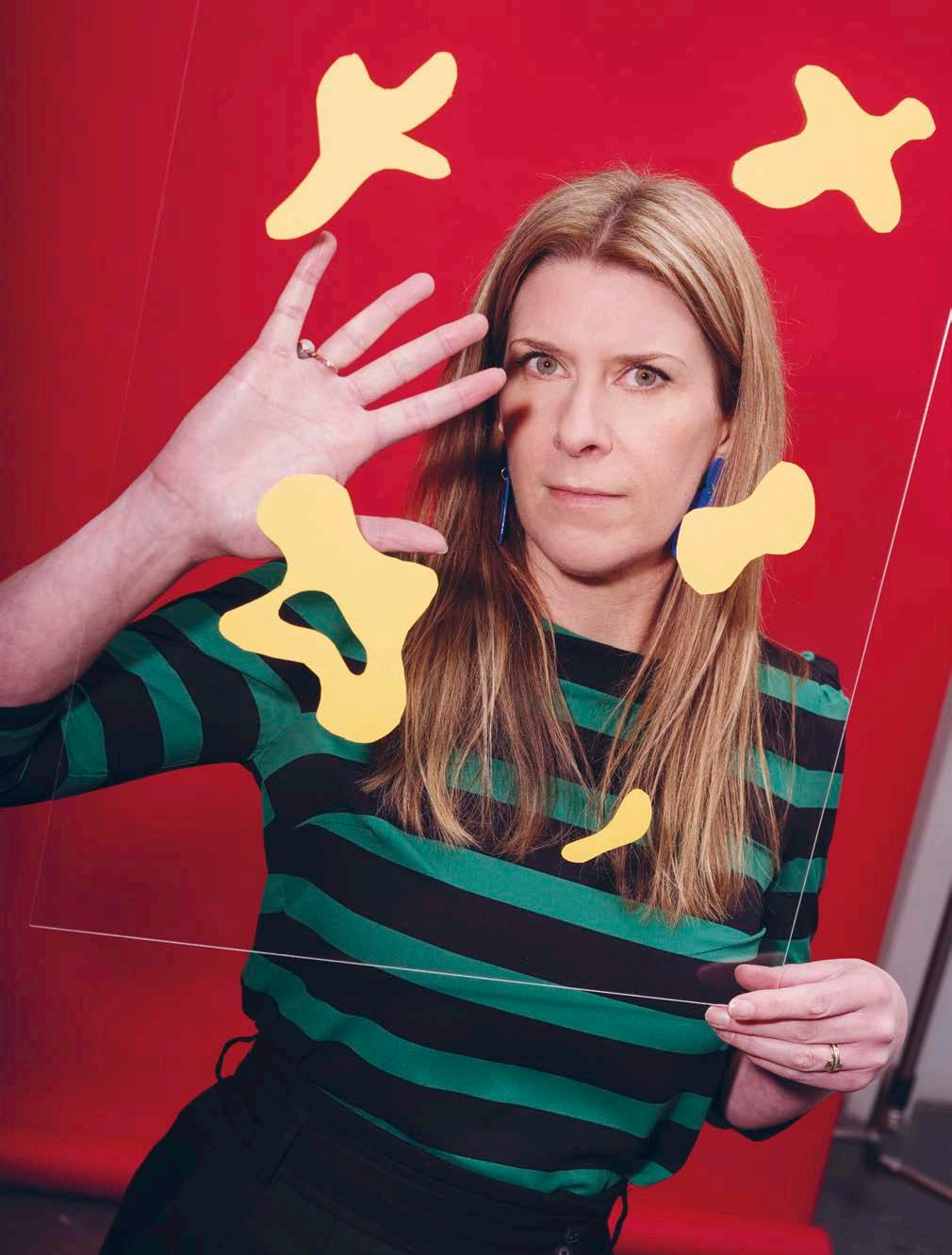
97

98
“I was massively inspired, and could see this path from the North East into a career in fashion.”
After her foundation course in art and design at Newcastle College, at Kingston Jo quickly swapped to menswear from the over-populated womenswear module and in her final year, made the brave decision to look for work in New York.
“I used my grant on flights to see a recruitment agent,” she recalls vividly.
“I didn’t tell my parents until I booked the tickets because I knew they’d go crazy.
“I should’ve spent the Easter holidays finishing my projects instead of jumping on a flight, but I was in a class of 28 students, one of the best courses in the country, and there were high-flying fashion designers being headhunted as couturiers in Paris.
“I wasn’t one of those and I knew it.
“I could’ve gone to London, but I wanted to see more of the world, and two people from Sunderland, who went to Kingston, had an apartment in New York and I slept on their sofa.
“I arrived the night before, saw the agent the next day, she arranged an interview that afternoon, they offered me a job, told me to get my degree and they’d pay for my visa.
“And after finishing my degree, I lived and worked as a fashion designer in New York for about a year-and-a-half.
“People were showing me it was possible; they were laying breadcrumbs and I tried to pick up the bits that resonated with me.
“My job now is to make sure, as an entrepreneur or business leader, that I can put those pebbles down so young people in the North East can see what track you can take.
“I spend a lot of time signposting careers, because youngsters really don’t know what we’ve got on the doorstep in the creative world.”
Jo joined American Eagle Outfitters, and while her time in the Big Apple was not without its trials and tribulations, it was well spent, filling a void and presenting an itch - called the world of forecasting - that Jo kept scratching.
She says: “I said yes straight away because it seemed a brilliant opportunity, but I didn’t really think about living in New York.
“All I could afford was a terrible, cheap hotel; the TV blew up in the room, the fire brigade had to come out.
“It was near Times Square, where no real New Yorker would live, but after four months, I lived in the Webster Apartments, a renowned safety base for working British females.
“You learn everyone runs to New York for a reason; I heard interesting stories from women from so many different backgrounds and cultures, and I’ve remained friends with many of them.
“I was designing men’s t-shirts, socks, hoodies and, from accepting the job in April, they grew 300 per cent that year.
“But it was not the pace I wanted to work at.
“I wanted to be active and busy, but I got bored quickly and wanted to push on.
“I had a commercial eye and loved the front end of the process like colour and mood boards, and understanding the consumer and what they wanted next.
“It was not until second year I realised that is a job and what trend forecasters do; they figure out where the market is going, and designers use that information to develop their ideas.
“When I got bored, I started doing mood boards and one day my boss said he knew I wanted to be a trend forecaster, but couldn’t pay me to do that.
“But, if I wanted to do it in my spare time…
“That was all I needed, and I stayed all hours after the day job and came back from America with two portfolios; trend forecasting and fashion designer.”
Jo returned in 2000 and headed for London, where a design director at Topman gave her an internship before she was
appointed menswear designer at Racing Green - back then the quintessentially middle-England brand of the Burton/Arcadia Group.
Jo admits she was not expected to survive, but the role at the heart of one of Britain’s leading fashion retailers allowed her to delve into trend forecasting.
And with only around 200 jobs across the globe, the former Queen Elizabeth’s High School pupil helped set the trend to become a trendsetter.
She says: “It was at least a couple of stops above where I was career-wise, and some people thought I couldn’t do it - I did too.
“It was quite a daunting job, but I thought I’d take it and learn. And I learned. A lot.
“I did the two jobs, moved around the group, a trend forecaster’s job came up, which was such a rare opportunity, and I joined a small agency called Bureaux, in London.
“It was a good jump, but I was determined to do it and spent three or four years with them, forecasting trends for designers and travelling the world. I loved it.
99
www.trendbible.com @TrendBible
"I was very creative as a child, always drawing, writing and playing imagination games"
“But it was heavy work, a lot of travel, really exhausting and just not sustainable for me, especially in the London agency culture.
“I left in 2005, saved three grand, came back to the North East and - against the advice of some colleagues who said you need to be in London, Paris or New York to work in trend forecasting - set up as a freelancer in my flat in Fenham.
“The world was starting to become more digitised, and you could present remotely, which of course has changed hugely now, but I’d no intention of turning it into a business.”
Among her early clients was Tesco, and the supermarket giant soon made the most of Jo’s expertise, expanding her role across a range of products and markets, including the food section and a prediction that a new TV show called The Great British Bake Off might lead to a surge in home baking…
After meeting chef Simon Walsh, once of Tynemouth’s Longsands Fish Kitchen and Close House fame, the couple had their first child, Aidan.
And, without the backing of maternity rights, as a freelance, the work dried up.
So Jo began teaching at Cleveland College of Art and Design and Northumbria University to fund her next project - the creation of a trend forecaster’s bible for companies.
It was back to cutting and sticking for the creation of an A4-sized booklet, and a return to New York.
“I wanted my own agency, but I needed a product that would sell and give me time to do other stuff and earn a living.
“That’s where the idea of TrendBible came from; a physical document I created and sold.
“I had an unpaid intern, and we’d sit on the spare room floor in my tiny Tyneside flat cutting up swatches and making this tangible product. It was like being five again.
“As my dad says, I’ve made a career out of cut and stick.
“It cost me £500 to get a minimum order of 50 printed, and when they landed at my flat I remember thinking, ‘I’ve created these and don’t know how to sell them’, so I took some funding from the Department for International Trade, got on a flight to New York, and took it to agents who sell trend books.
“My competitors made excellent trend books, with whole teams of people from London and Paris.
“I tipped up with mine and they said, ‘well, it’s not very good’. And it wasn’t.
“I did sell two to Target and JC Penney, and thought if two US supermarkets want this, there is something in it.
“I took the feedback, came back to make it better and season-on-season improved the product.
“In the second year, we sold 13 and then 30-odd…”
As more companies signed up for their MyTrendBible subscription, so the company continued to expand and develop, with Jo winning North East Woman Entrepreneur of the Year five years ago.
At the beginning of 2020, the firm secured a new deal with a Chinese company, just weeks after celebrating reaching £1 million turnover.
And then along came COVID-19 - a black swan event very few in the industry predicted could have such a devastating and long-lasting impact on the entire planet.
Jo, who has a second son, Cameron, seven, says: “I have a picture from February 2020 with confetti cannons, cake and all the staff. We’d just signed a three-year deal with a Chinese company.
“We’d been out there and knew something was happening - and then it unfolded so quickly.
“We lost 80 per cent of the business and furloughed 20 staff, apart from me and the sales guy.
“I had no choice.
“I couldn’t get staff in to create or
100
www.trendbible.com @TrendBible
“It was very difficult; homeschooling two kids, trying to run a business, furloughing everyone and losing a massive chunk of our income, not knowing if we’d make it"
receive goods for printers, and it was then I realised I needed to switch to digital output.
“Having wanted to for years, but having never had the guts, I took bank loans to use as an investment to develop an online platform, staffed it and created an online subscription for a digital version called MyTrendBible.
“It was very difficult; home-schooling two kids, trying to run a business, furloughing everyone and losing a massive chunk of our income, not knowing if we’d make it through.
“But I learned a lot of new skills, like building resilience.
“I spent a lot of time on Teams with other more experienced entrepreneurs, who stayed calm, and I took a lot of comfort from them.
“I learned to be level-headed and clearheaded on decision making and not taking myself on an emotional rollercoaster every day.
“I needed to switch off from the living room, live elsewhere in the house, and put down clear boundaries.
“Before the pandemic, the business and I were so intertwined, you wouldn’t have been able to separate them; now there’s a healthy distance.
“I had to delegate, allow autonomy in people’s roles and stand back.
“We’ve been recovering ever since, and finally this year started to grow again, but it’s taken three years and been extremely hard.
“Thank goodness we took the gamble to launch the online platform in March 2022.
“When I was younger I was impulsive, and would just go for it, but by then I was a mum and had responsibilities to my family and 20-odd staff.
“It was frightening making decisions like that.
“But there’s a risk to not doing anything at all, and some of the publishers who didn’t switch to digital are no longer here.
“It’s a balance, and that’s always the way
to run a business.”
Jo’s currently writing her first book Trend Leader, which will be published in the summer.
It will highlight the online training programme which, she says, is part of her commitment to developing the next generation of trend leaders.
She aims to build TrendBible to as much as a £10 million turnover operation within the next five years, expanding its customer base across the UK, US, Australia and Northern Europe.

She adds: “We’re really confident about growth, and we’ll push on.
“We have ambitions to be known globally as the trend agency that owns the future of life at home, so if people are forecasting trends for the home, we are in the number one spot for that.
“And we’re so nearly there.
“We have a couple of enormous and brilliant competitors, but they mainly focus
on the fashion industry.
“It’s about anything that will have an impact on the home, such as the laundry routine of the future.
“If water becomes an even more precious commodity, will washing machines work on half the water, what will the powder have to perform like?
“That’s forecasting for the home.
“People think it’s decor, cushions, paint and wallpaper, and it can be, but sometimes it’s about the dynamic of family and relationships, and how that is changing.
“Researchers around the world ping new information to us 24/7, and my team’s job is to make sense of that, cluster it into themes, decide which are the safe bets and which might inspire design teams.
“I love it.
“No two days are the same.
“The nature of tracking and forecasting is born out of curiosity - and that is in me.”
101
4Congratulations on your new role. Tell us a little more about what it entails
My role is to protect what we’ve built over the last 80 years and inspire the next generation of leaders to take the company forward and create a lasting legacy.
To do this, I’ll be building on a strong values-driven culture that we’ve been actively embedding in the business over recent years.
We’ve been planning this chapter of AV Dawson’s evolution for some time.
This year marks the final one of a four-year programme to create a group structure, launching four subsidiary companies under the AV Dawson parent company.
The last of these companies is Port of Middlesbrough Limited, which in October will evolve from simply being the brand name for our site, to becoming a trading company.
Moving to a group structure was about creating more opportunity for individual colleagues, while reducing business risk by not delivering the diverse portfolio of port services, on-site logistics, ships agency, road haulage and property through one company.
My priority will be to enable each of these subsidiaries to be successful, sustainable businesses, while supporting the wider group.
4As a third-generation business, AV Dawson has expanded over the decades under family leadership. Against that backdrop, how significant a move is your appointment, and how excited are you to have been chosen to drive its next growth phase?
AV Dawson is one of the largest, longest-standing family businesses in Teesside, so of course it’s a major step for Gary (Dawson) to move from managing director to chair and appoint me in to this new role.
I feel genuinely honoured and excited, and recognise the trust Gary is putting in me to ensure AV Dawson continues to be the unique business it is.
I’m already feeling the responsibility on my shoulders – not only to Gary and the Dawson family past and present, but also to my 200 colleagues, our customers and local community.
4With a CV that complements time at AV Dawson with a number of years at the North East England Chamber of Commerce, you are very familiar with the region’s ever-evolving business landscape, its challenges and opportunities. Using that knowledge and insight, just how strong do you believe the area’s business sector is, and where do you see potential for further success?
I have never seen the energy, positivity and potential that we’re seeing in the region right now, particularly in Teesside.
There always seemed to be a gravitation towards Newcastle and its thriving professional services sector.

I know people will feel this was driven by the Chamber, but having had a backstage pass, I could see there were other dynamics at play.
Teesside’s business community seemed harder to engage and bring together.
Of course, there were individual business successes, but these organisations, whether large corporates or SMEs, often didn’t seem to want to shout about themselves – they just quietly and modestly got on with the job.
And then Teesside seemed to unite and find a voice. The key turning point for me was in May 2017, when the Tees Valley elected its first mayor.
I felt that even if the mayor did nothing more than talk up Teesside at various events outside the region, this would deliver huge benefit.
The mayoral model has certainly worked, and it has united people too.
Teesside hasn’t tried to be something it’s not. Instead, it’s recognised its strengths, what makes it different from everywhere else and has started shouting about it.
102 Charlie Nettle The Last Word Feature
@AVDawson
Closing this month’s issue of North East Times Magazine, Charlie Nettle, group managing director designate at AV Dawson, talks about his new role, the responsibilities that come with overseeing the next chapter in a third-generation company’s history and his delight at the momentum building across Teesside’s business sector.
www.portofmiddlesbrough.com

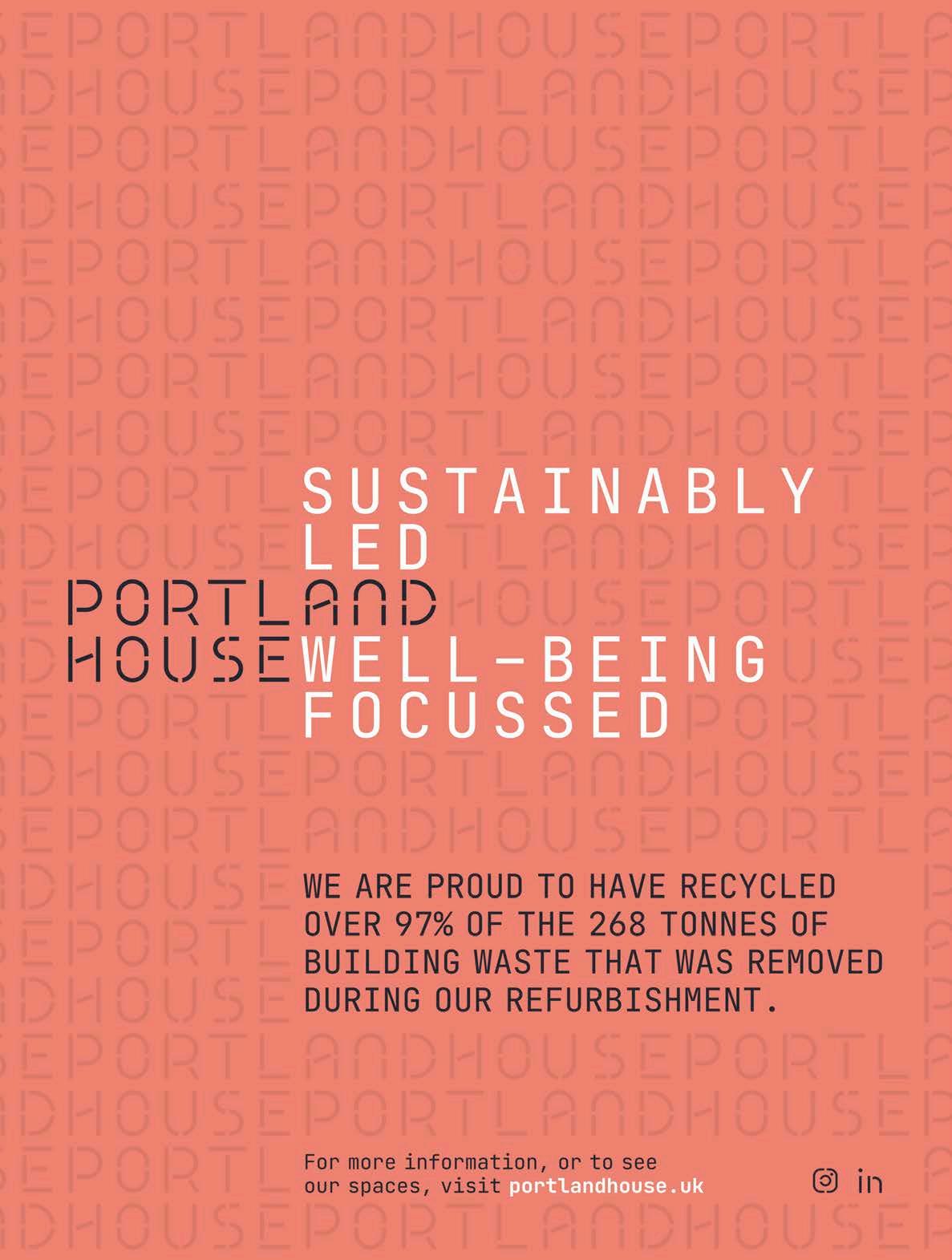















 Words by Steven Hugill
Words by Steven Hugill

 Words by Colin Young
Words by Colin Young

 Words by Steven Hugill
Words by Steven Hugill














































 Words by Steven Hugill
Carrington
Words by Steven Hugill
Carrington



























































































